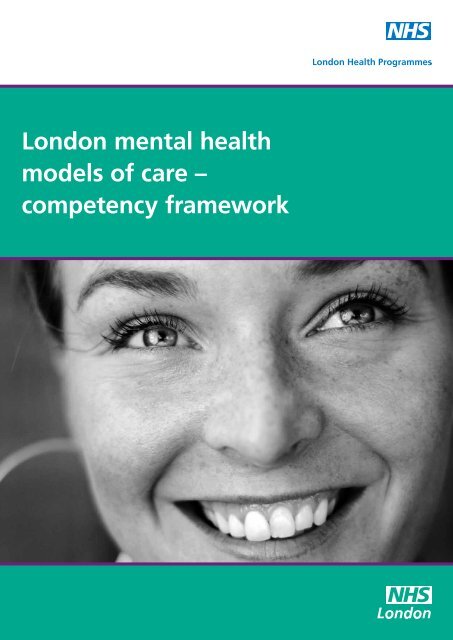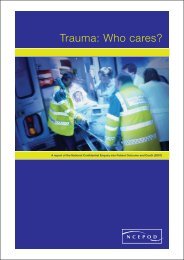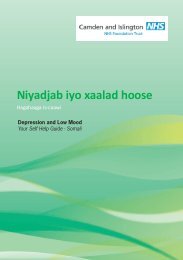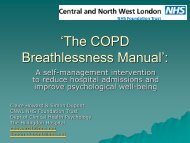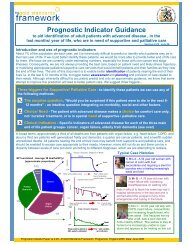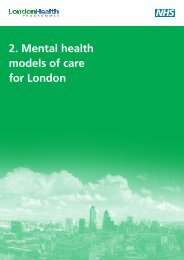London mental health models of care â competency framework - OPM
London mental health models of care â competency framework - OPM
London mental health models of care â competency framework - OPM
- No tags were found...
Create successful ePaper yourself
Turn your PDF publications into a flip-book with our unique Google optimized e-Paper software.
To assist workforce leads, commissionersand training managers the <strong>competency</strong><strong>framework</strong> is designed to be used on anumber <strong>of</strong> levels - at an individual level, ata team level or at an organisational level.Executive summary● ● At an individual level, the competenciescan be used by individuals across a verywide range <strong>of</strong> services, pr<strong>of</strong>essions androles for self-development, to reflecton work and practice, and to identifydevelopment and training needs indiscussion with their managers.● ● At a team or organisational level, thecompetencies can be used by providers,clinicians, managers and commissionersto consider requirements within a giventeam, service or organisation, andidentify collective development andtraining needs.The <strong>competency</strong> <strong>framework</strong> is designed tohelp clinicians, commissioners, employersand managers when designing local <strong>care</strong>pathways and commissioning services, toidentify training needs within and acrossworkforces; to inform the development<strong>of</strong> job descriptions and training anddevelopment plans and to support individualself assessment and development.A <strong>competency</strong> <strong>framework</strong> for all those working with people with <strong>mental</strong> <strong>health</strong> problems in <strong>London</strong>5
A key objective <strong>of</strong> the <strong>models</strong> <strong>of</strong> <strong>care</strong> is toenable more people with <strong>mental</strong> <strong>health</strong>problems to be supported appropriatelywithin primary <strong>care</strong> and community settings,thereby reduce unnecessary secondary <strong>care</strong>admissions. Such an approach should leadto better, more person-centred <strong>care</strong>, whileat the same time enabling secondary <strong>care</strong>services to provide better quality <strong>care</strong> forthose who need that level <strong>of</strong> support.The <strong>models</strong> are intended to contribute tothe delivery <strong>of</strong> the government’s <strong>mental</strong><strong>health</strong> strategy, suicide reduction strategyand quality, innovation, productivity andprevention (QIPP) plans for <strong>mental</strong> <strong>health</strong>.Several national policies and programmesare aimed at reducing variation andensuring continuous improvement in quality,productivity and innovation within <strong>health</strong>services, including <strong>mental</strong> <strong>health</strong>. These createthe operational context in which large numbers<strong>of</strong> staff - within and outside the NHS - willsupport people with <strong>mental</strong> <strong>health</strong> problems,and will impact on the way many services arecommissioned and run. The key policies anddevelopments that are driving these changesare summarised in Appendix 2.Staff across a range <strong>of</strong> <strong>health</strong> and public andvoluntary sector services need to develop theskills, knowledge and confidence to workin different ways if QIPP benefits are to berealised and this <strong>framework</strong> defines whatindividuals and teams need to do in order tosupport service users more effectively.The <strong>mental</strong> <strong>health</strong> <strong>models</strong><strong>of</strong> <strong>care</strong> can be downloaded attinyurl.com/d7vs967The <strong>London</strong> population and the<strong>mental</strong> <strong>health</strong> <strong>of</strong> <strong>London</strong>ers<strong>London</strong> is home to some 8.17m people 1with an extremely diverse and transientpopulation. It is the UK’s most culturallydiverse city; more than 300 languages arespoken in <strong>London</strong> and over 40% <strong>of</strong> theUK’s Black and Minority Ethnic populationlive in the capital. <strong>London</strong> has high levels<strong>of</strong> deprivation, with significant variationacross the city: more than half <strong>of</strong> <strong>London</strong>’sboroughs are within the 30% most deprivedareas in England, and ten boroughs areamongst the most deprived 10% 2 . Significantnumbers <strong>of</strong> people come to <strong>London</strong> andleave <strong>London</strong> each year, with many inner<strong>London</strong> boroughs having particularlytransient populations.An estimated one in four <strong>of</strong> the UKpopulation will experience a diagnosable<strong>mental</strong> <strong>health</strong> problem at some point intheir lives 3 . At any given time, around one insix adults are experiencing a <strong>mental</strong> <strong>health</strong>problem, and for half <strong>of</strong> these people theproblem will last for over a year 4 . Within<strong>London</strong> the levels <strong>of</strong> <strong>mental</strong> <strong>health</strong> needand demands on <strong>mental</strong> <strong>health</strong> services aregreater than the UK average 5 . Prevalenceis greatest in the most deprived parts <strong>of</strong><strong>London</strong>, with social and economic factorsaffecting the incidence and duration <strong>of</strong>1 GLA Intelligence Update demography team, 2010 mid-yearpopulation estimates, estimates for June 2010, based on dataissued by the Office for National Statistics, and published June20112 Mental <strong>health</strong> services case for change for <strong>London</strong>, <strong>London</strong>Mental Health Models <strong>of</strong> Care project, <strong>London</strong> HealthProgrammes, June 20113 http://www.nhsconfed.org/Publications/Documents/Key_facts_<strong>mental</strong>_<strong>health</strong>_080911.pdf4 New Horizons: a shared vision for <strong>mental</strong> <strong>health</strong>, Department <strong>of</strong>Health, 2009.5 Mental <strong>health</strong> services case for change for <strong>London</strong>, <strong>London</strong>Mental Health Models <strong>of</strong> Care project, <strong>London</strong> HealthProgrammes, June 2011Introduction and backgroundA <strong>competency</strong> <strong>framework</strong> for all those working with people with <strong>mental</strong> <strong>health</strong> problems in <strong>London</strong>7
Introduction and background<strong>mental</strong> <strong>health</strong> problems, and worsening<strong>health</strong> inequalities 6 . Dementia is morecommon in outer <strong>London</strong> due to its olderpopulation.<strong>London</strong> has higher than average numbers<strong>of</strong> people with complex needs includingrefugees, asylum seekers, homeless peopleand people with a dual diagnosis <strong>of</strong> <strong>mental</strong>illness and drug or alcohol problems 7,8 . Thenature <strong>of</strong> the <strong>London</strong> population, and theneeds <strong>of</strong> this population is dynamic and willcontinue to change in future years.6 ibid7 ibid8 In March 2011 <strong>London</strong> had 35,920 statutory homeless householdsin temporary accommodation, out <strong>of</strong> a total <strong>of</strong> 48,920 in England,Live Tables on Homelessness, Department for Communities andLocal Government, last updated March 2012The <strong>London</strong> <strong>mental</strong> <strong>health</strong> <strong>models</strong><strong>of</strong> <strong>care</strong> core pathwayTo support the <strong>models</strong> <strong>of</strong> <strong>care</strong>, the projectteam at <strong>London</strong> Health Programmes,supporting the project clinical leads,has, with a range <strong>of</strong> other stakeholders,developed a core pathway, setting out thefive essential functions that staff workingwith people with <strong>mental</strong> <strong>health</strong> problemsneed to carry out:l Assessmentl Effective referral to appropriate servicesl Planningl Implementation(intervention and treatment)l Evaluation8<strong>London</strong> Health Programmes
The <strong>London</strong> MHCFThe <strong>London</strong> <strong>mental</strong> <strong>health</strong><strong>competency</strong> <strong>framework</strong>How the <strong>competency</strong> <strong>framework</strong>was developedThe process <strong>of</strong> developing the <strong>competency</strong><strong>framework</strong> was very inclusive, as was theprocess for developing the <strong>models</strong> <strong>of</strong> <strong>care</strong>.Significant input was harnessed from <strong>mental</strong><strong>health</strong> specialists in the field – includingthe core pr<strong>of</strong>essional groups <strong>of</strong> nursing,occupational therapy, psychiatry, psychology,and social work – and in addition a widerange <strong>of</strong> other stakeholders were engagedincluding people using <strong>mental</strong> <strong>health</strong>services, their families, friends and <strong>care</strong>rs,GPs, pharmacists, <strong>mental</strong> <strong>health</strong> charities andvoluntary and community sector providers,employer and workforce organisations, andnon-<strong>mental</strong> <strong>health</strong> staff. Through a series <strong>of</strong>focus groups and interviews, over 100 peoplewere involved. This wide-level engagementhas made a substantial contribution to therigour and relevance <strong>of</strong> the <strong>framework</strong>.In developing this <strong>competency</strong> <strong>framework</strong>,it has been important to be mindful <strong>of</strong> thepotential linkages with existing <strong>framework</strong>s,but also <strong>of</strong> the complexity <strong>of</strong> trying to mapa large number <strong>of</strong> links to many differentdocuments. The aim <strong>of</strong> such mappingshould always be to assist those using the<strong>framework</strong>s, not to confuse them. Appendix3 (Related <strong>competency</strong> <strong>framework</strong>s)summarises the <strong>competency</strong> <strong>framework</strong>s (inchronological order) that are relevant to thebroadest range <strong>of</strong> staff working with peoplewith <strong>mental</strong> <strong>health</strong> problems in <strong>London</strong> 9 .This <strong>competency</strong> <strong>framework</strong> is not aimedexclusively at specialist <strong>mental</strong> <strong>health</strong> staff,but at everyone who comes into contact withpeople with <strong>mental</strong> <strong>health</strong> problems. Thus,it has been explicitly linked most closelywith those existing <strong>framework</strong>s that havethe widest reach and application – the TenEssential Shared Capabilities 10 , and the NHSKnowledge and Skills Framework (KSF) 11 .However, there is, quite rightly, a great deal<strong>of</strong> consistency and congruence with theother <strong>competency</strong> <strong>framework</strong>s mentioned inAppendix 3.An accompanying document is availablewhich maps the <strong>London</strong> <strong>mental</strong> <strong>health</strong>competencies and NHS Knowledge and SkillsFramework (KSF), linking the competencies inthe <strong>framework</strong> to the dimensions in the KSF.This document is available attinyurl.com/cn4azcm9 It is also worth noting that the Social Care Institute for Excellence(SCIE) has produced a suite <strong>of</strong> briefings, guides and othermaterials that are useful to those working with people with <strong>mental</strong><strong>health</strong> problems. See www.scie.org.uk10 The Ten Essential Shared Capabilities – A Framework for theWhole <strong>of</strong> the Mental Health Workforce, National Institute forMental Health England, Sainsbury Centre for Mental Health, NHSUniversity, Department <strong>of</strong> Health, August 200411 The NHS Knowledge and Skills Framework (NHS KSF),Department <strong>of</strong> Health, Oct 200410 <strong>London</strong> Health Programmes
Rationale for the <strong>competency</strong><strong>framework</strong>The <strong>models</strong> <strong>of</strong> <strong>care</strong> promote a refocusing <strong>of</strong>existing services and the roles <strong>of</strong> those whowork in them. They introduce new roles andways <strong>of</strong> working. Implementing the <strong>models</strong>will require people to do things differently indifferent settings; this <strong>competency</strong> <strong>framework</strong>identifies the knowledge and skills required tosupport them.The competencies identified in each <strong>of</strong> theparts <strong>of</strong> the <strong>framework</strong> will support and bringabout some <strong>of</strong> the changes proposed withinthe <strong>models</strong> <strong>of</strong> <strong>care</strong>:●●Refocusing existing services to do thingsdifferently so as to promote recoveryand enable people who no longer needspecialist services to control the planningand delivery <strong>of</strong> their own <strong>care</strong>.●●Introducing shared <strong>care</strong> approaches formany people with long term <strong>mental</strong><strong>health</strong> conditions: this means a transfer<strong>of</strong> clinical responsibility from secondaryto primary <strong>care</strong>, with the active supportand collaboration <strong>of</strong> secondary <strong>care</strong>, andenhanced information exchange.●●Creating navigator roles to helppeople access services that can supportthem with a range <strong>of</strong> issues, such asemployment and housing, which may beintegral to their recovery.●●Enabling better partnership workingand drawing on the expertise <strong>of</strong>individuals, family members, friendsand <strong>care</strong>rs, and a range <strong>of</strong> relevantpr<strong>of</strong>essionals, especially in developingthe most appropriate plan for anindividual’s <strong>care</strong>.●●Sharing <strong>of</strong> expertise by specialists tohelp build capacity in non-specialistservices, and to ensure the holisticneeds <strong>of</strong> individuals can be metwithout the need for them to bemanaged in secondary <strong>care</strong>.●●Reforming secondary <strong>care</strong> services toprovide swifter access to people whoneed their input, and improve theircapacity to develop the specialised<strong>mental</strong> <strong>health</strong> services that only theycan provide.The <strong>competency</strong> <strong>framework</strong> also articulatesthe means by which the aspirations <strong>of</strong> the<strong>models</strong> <strong>of</strong> <strong>care</strong> can be achieved - improvingcommunication between primary andsecondary <strong>care</strong>, the voluntary andcommunity sector, clinical commissioninggroups and local authorities; ensuringthat physical <strong>health</strong> needs are properlyassessed and addressed by all servicesand the physical <strong>health</strong> inequalitiessuffered by people with <strong>mental</strong> <strong>health</strong>problems are minimised; promotinga personalised recovery approach,involving people’s family, friends and<strong>care</strong>rs where appropriate; reducing thestigma associated with <strong>mental</strong> <strong>health</strong>problems, as more people receive supportin non-stigmatising settings; promotingthe routine use <strong>of</strong> outcome measures inrelation to <strong>mental</strong> <strong>health</strong>; and contributingto the delivery <strong>of</strong> the government’s <strong>mental</strong><strong>health</strong> strategy, suicide reduction strategyThe <strong>London</strong> MHCFA <strong>competency</strong> <strong>framework</strong> for all those working with people with <strong>mental</strong> <strong>health</strong> problems in <strong>London</strong>11
How the <strong>framework</strong> is structuredThe <strong>competency</strong> <strong>framework</strong> is presented inthree parts:●●Part one sets out universalcompetencies relevant to everyone whomay, as part <strong>of</strong> their day-to-day work,come into contact with people with<strong>mental</strong> <strong>health</strong> problems.●●Part two sets out further competenciesfor staff who are not <strong>mental</strong> <strong>health</strong>specialists, but who work with a widerclient group which may include peoplewith a <strong>mental</strong> <strong>health</strong> problem, and/or people who may be experiencing a<strong>mental</strong> <strong>health</strong> crisis.●●Part three sets out additionalcompetencies for staff working withpeople with <strong>mental</strong> <strong>health</strong> problems– either as a main client group, or as asignificant part <strong>of</strong> a wider client groupfor example <strong>mental</strong> <strong>health</strong> cliniciansand GPs.This new <strong>competency</strong> <strong>framework</strong> doesnot seek to replicate or replace the range<strong>of</strong> well-developed <strong>framework</strong>s providingdetailed coverage <strong>of</strong> the competenceand capability requirements <strong>of</strong> differentpr<strong>of</strong>essional groups. Rather the intentionis to articulate a set <strong>of</strong> knowledge, skills,attitudes and behaviours that are desirableand appropriate for everyone who comesinto contact with people with <strong>mental</strong><strong>health</strong> problems. Very specific or technical<strong>framework</strong>s for certain <strong>mental</strong> <strong>health</strong>pr<strong>of</strong>essionals are placed at the top <strong>of</strong> thediagram below. These are not examined indetail here, as they have their own rigourand legitimacy. Nothing within this <strong>London</strong><strong>mental</strong> <strong>health</strong> <strong>competency</strong> <strong>framework</strong> isintended to contradict or replace theseexisting <strong>framework</strong>s.Competencies forspecific pr<strong>of</strong>essionalgroupsThe <strong>London</strong> MHCFStructure <strong>of</strong> the<strong>competency</strong> <strong>framework</strong>Part threecompetenciesPart twocompetenciesPart onecompetenciesA <strong>competency</strong> <strong>framework</strong> for all those working with people with <strong>mental</strong> <strong>health</strong> problems in <strong>London</strong>13
The <strong>London</strong> MHCFHow to use this <strong>competency</strong><strong>framework</strong>The competencies in this <strong>framework</strong> arenecessarily generic enough to apply across awide and diverse range <strong>of</strong> people.Each part <strong>of</strong> the <strong>framework</strong> is additionaland complementary to the previous parts:people with part two competencies shouldalso have part one competencies; they arefurther competencies, not alternative ones.The competencies in this <strong>framework</strong> areintended to be develop<strong>mental</strong>: it would notbe realistic to expect all staff, across such awide range <strong>of</strong> services and organisations, tohave all these competencies as a minimumrequirement. Rather, they are intended ascompetencies that clinicians, commissioners,managers and staff will aspire to, and willsupport staff to work towards throughtraining and development.In considering these competencies, itwill also be necessary to think about anindividual’s scope <strong>of</strong> practice – the areaswhere a person has the knowledge, skills andexperience to work safely and effectively.An individual’s scope <strong>of</strong> practice is likely tochange over the course <strong>of</strong> their working life,and may expand as they develop new skills,for example through training or education.When using this <strong>framework</strong>, individuals andtheir managers should pay attention to theirexisting scope <strong>of</strong> practice, what an individualis currently feeling confident and competentto do, and what impact it would have werethey to gain some <strong>of</strong> the other competenciesin this <strong>framework</strong>.organisational level – to assist workforceleads, commissioners and training managers.●●At an individual level, thecompetencies can be used by individualsacross a very wide range <strong>of</strong> services,pr<strong>of</strong>essions and roles for selfdevelopment,to reflect on work andpractice, and to identify developmentand training needs in discussion withtheir managers.●●At a team or organisational level,the competencies can be used bymanagers and commissioners toconsider what competencies arerequired within a given team, serviceor organisation, and identify collectivedevelopment and training needs.The competencies in part one should applyto everyone who may come into contactwith people with a <strong>mental</strong> <strong>health</strong> problem aspart <strong>of</strong> their day to day work, and thereforemanagers and commissioners should aspire tosee all individuals within their organisationshaving part one competencies. For part twoand part three competencies however, therequirements will differ according to factorssuch as, for example, the nature <strong>of</strong> the team,service or organisation, its functions, ways <strong>of</strong>working and overall skill-mix.The <strong>competency</strong> <strong>framework</strong> is designedto be used on a number <strong>of</strong> levels - at anindividual level, at a team level or at an14 <strong>London</strong> Health Programmes
How might evidence <strong>of</strong> thecompetencies be provided?There is no single right way to use thesecompetencies as part <strong>of</strong> an assessment orappraisal process. As they apply across such abroad range <strong>of</strong> staff and pr<strong>of</strong>essional groups,they will be assessed in different ways indifferent organisations and situations. It willbe up to individuals, line managers, seniormanagers and commissioners to determine,in any given situation or service, whichspecific competencies are required, and whatevidence they draw on to determine whethera <strong>competency</strong> is being met, however thefollowing may provide useful examples <strong>of</strong>ways in which evidence might be gathered:●●Learning and reflections from: informalor formal study and reading; trainingcourses (including accredited courses);attending events or conferences;watching programmes, videos or DVDs;shadowing other staff or visits to otherservices; conversations with peoplewith <strong>mental</strong> <strong>health</strong> problems and/or relatives and <strong>care</strong>rs; networkingand conversations with colleaguesand others, membership <strong>of</strong> groups orforums; use <strong>of</strong> directories, toolkits andother resources.Using the <strong>competency</strong> <strong>framework</strong>●●Reflections on one’s own work andpractice and on interactions withothers.●●Feedback from line managers,informally and/or more formallye.g. through one-to-one meetings,supervisions, appraisals andperformance reviews.●●Feedback from colleagues, informallythrough discussions and/or moreformally, including through 360 0reviews if these are available.●●Feedback received formally orinformally from people who use theservices or the public, about individualsor the service/place <strong>of</strong> work.A <strong>competency</strong> <strong>framework</strong> for all those working with people with <strong>mental</strong> <strong>health</strong> problems in <strong>London</strong>15
Using the <strong>competency</strong> <strong>framework</strong>Using the <strong>competency</strong> <strong>framework</strong>The <strong>competency</strong> <strong>framework</strong> is designed to be used on a number <strong>of</strong> levels and settings; atan individual, team or organisational level. It will be for local consideration as to how the<strong>framework</strong> could be most usefully applied in different settingsThe table below provides an overview <strong>of</strong> a range <strong>of</strong> possible roles and how they mightapply the <strong>framework</strong>. It is not intended that either the list <strong>of</strong> possible roles nor the potentialapplications should be considered exhaustive; they are included to provide guidance.Group definition Possible roles PartPartPartApplication123People who maycome into contactwith people with<strong>mental</strong> <strong>health</strong>problems as part <strong>of</strong>their day to day workStaff who are not<strong>mental</strong> <strong>health</strong>specialists, but whowork with peoplewho may havea <strong>mental</strong> <strong>health</strong>problem, and/orpeople who maybe experiencing a<strong>mental</strong> <strong>health</strong> crisis,as part <strong>of</strong> a widerclient groupPrimary <strong>care</strong> receptionistA&E receptionistsHousing department staffEmployment staffVoluntary sector staffPractice /district nursesHealth visitors /<strong>health</strong>trainersA&E staff /generalhospital staffPolice<strong>London</strong> AmbulanceService staffHousing support workersAdvice servicesPharmacistsSubstance misuseworkersSocial <strong>care</strong> staff4 Identifying areas forpersonal developmentIncreasing <strong>mental</strong> <strong>health</strong>awarenessIdentifying individualtraining needsPreparing for appraisal4 4 Personal developmentIncreasing <strong>mental</strong> <strong>health</strong>awarenessIndentifying individualtraining needsPreparing for andproviding staff appraisalInforming policydevelopmentService developmentDeveloping trainingprogrammes16<strong>London</strong> Health Programmes
Group definition Possible roles PartStaff working withpeople with <strong>mental</strong><strong>health</strong> problems– either as a mainclient group or as asignificant part <strong>of</strong> awider client groupMental <strong>health</strong> cliniciansPolice <strong>of</strong>ficers withparticular <strong>mental</strong> <strong>health</strong>responsibilitiesGPsVoluntary sector <strong>mental</strong><strong>health</strong> workersMental <strong>health</strong> advocacyworkers<strong>London</strong> AmbulanceServiceNavigators/peer supportworkers1Part2Part3Application4 4 4 Indentifying areas forpersonal developmentIdentifying individualtraining needsTeam training needsanalysisDeveloping trainingprogrammesInforming and developingjob descriptions andperson specificationsService design andredesignMental <strong>health</strong> strategyand policy developmentUsing the <strong>competency</strong> <strong>framework</strong>Developing outcomes<strong>framework</strong>sLocal educationand training boards(LETBs)Clinicalcommissioninggroups (CCGs)Local HR, workforceand training leadsHealth<strong>care</strong> providers, education and training providers, and pr<strong>of</strong>essionaladvisory bodies. Collectively commissioning education and training according tolocally determined need.Health<strong>care</strong> providers, clinicians and pr<strong>of</strong>essional advisory bodies. Collectivelycommissioning clinical services according to locally determined need.Individually or collectively designing policies and tools for organisations and<strong>health</strong> communities, to support recruitment, training, pr<strong>of</strong>essional and teamdevelopment and appraisal processes.A <strong>competency</strong> <strong>framework</strong> for all those working with people with <strong>mental</strong> <strong>health</strong> problems in <strong>London</strong>17
1. Personal orientation and interpersonal skillsDomain and CompetencyheadingEmpathy Being able to understand the thoughts and feelings <strong>of</strong> otherpeople, to see things from their perspectives, and to givesensitive and appropriate responses to other people's emotionalstates.Respect Interacting with other people with courtesy and respect,irrespective <strong>of</strong> their status (e.g. <strong>health</strong>, social, pr<strong>of</strong>essional status).Not acting in ways which are rude, belittling, patronising,dismissive, or consciously hurtful.Nonjudge<strong>mental</strong>them.Accepting and valuing other people as they are, without judgingattitudeEvidence couldinclude beingable toDemonstrate anability to reflecton own work andpractice, includinginteractions withothers (and possiblybe able to describechanges in ownbehaviour or ways <strong>of</strong>working as a result).Part one – universal competenciesHolisticapproachSelf awarenessCommunicationBeing able to see the 'whole person' rather than seeing someonejust in terms <strong>of</strong> 'a problem' or 'a diagnosis'.Self awareness <strong>of</strong> the impact <strong>of</strong> one's own behaviour, language,and body language on others, including people with <strong>mental</strong><strong>health</strong> problems.Being able to communicate clearly, sensitively and effectively; thisincludes communicating both verbally and in writing, and sharingrelevant information appropriately.A <strong>competency</strong> <strong>framework</strong> for all those working with people with <strong>mental</strong> <strong>health</strong> problems in <strong>London</strong>19
Part one – universal competencies2. Awareness and knowledgeDomain and CompetencyheadingAwareness <strong>of</strong> Awareness <strong>of</strong> the prevalence <strong>of</strong> <strong>mental</strong>prevalence <strong>of</strong> <strong>health</strong> problems, and the likelihood that<strong>mental</strong> <strong>health</strong> many people may have experience <strong>of</strong> <strong>mental</strong>problems<strong>health</strong> problems.Awareness <strong>of</strong> Awareness <strong>of</strong> the main kinds <strong>of</strong> <strong>mental</strong><strong>mental</strong> <strong>health</strong> <strong>health</strong> condition and symptoms (e.g.conditions and depression, anxiety disorders, bipolarsymptomsdisorder, schizophrenia).Evidence could includebeing able to●●Demonstrate an awareness <strong>of</strong> therange and prevalence <strong>of</strong> <strong>mental</strong><strong>health</strong> problems.●●Demonstrate an understanding<strong>of</strong> the potential impact for peopleexperiencing a <strong>mental</strong> <strong>health</strong>crisis.Awareness <strong>of</strong>concept <strong>of</strong> <strong>mental</strong><strong>health</strong> crisisAwareness <strong>of</strong>concept <strong>of</strong> longterm <strong>mental</strong> <strong>health</strong>conditionUnderstanding<strong>of</strong> <strong>mental</strong> <strong>health</strong>stigma anddiscriminationAwareness <strong>of</strong> the concept and possibility<strong>of</strong> <strong>mental</strong> <strong>health</strong> crisis, and the potentialimpact on people's behaviour, feelings andperceptions when experiencing such a crisis.Awareness <strong>of</strong> the concept and possibility<strong>of</strong> long term <strong>mental</strong> <strong>health</strong> conditions, andthe potential impact on people's behaviour,feelings and perceptions <strong>of</strong> living with along term <strong>mental</strong> <strong>health</strong> condition.Understanding <strong>of</strong> the stigma anddiscrimination faced by people with <strong>mental</strong><strong>health</strong> problems.●●Demonstrate an ability to reflecton whether there are gaps in ownawareness and knowledge <strong>of</strong><strong>mental</strong> <strong>health</strong> problems and howthese might be addressed.●●Demonstrate an ability to applyown <strong>mental</strong> <strong>health</strong> awareness andknowledge in real-life situations,and to identify whether thisknowledge was adequate for thesituation(s).20 <strong>London</strong> Health Programmes
3. System knowledgeDomain and CompetencyheadingSignposting people Knowledge <strong>of</strong> appropriatewith a range <strong>of</strong> sources <strong>of</strong> help and<strong>mental</strong> <strong>health</strong> support for people withproblemsa range <strong>of</strong> <strong>mental</strong> <strong>health</strong>problems.Ability to signpost peopleto appropriate support.Evidence could include being able to●●Demonstrate knowledge <strong>of</strong> <strong>mental</strong> <strong>health</strong> resources– including sources <strong>of</strong> information used to supportpeople experiencing a <strong>mental</strong> <strong>health</strong> crisis (localresources and services).●●Demonstrate an ability to identify what additionalresources could be drawn on.Part one – universal competenciesSeeking supportto ensure theimmediate safety <strong>of</strong>someone in <strong>mental</strong><strong>health</strong> crisisSignposting peoplein <strong>mental</strong> <strong>health</strong>crisisKnowledge and abilityto seek necessary helpand support to ensurethe immediate safety <strong>of</strong>someone experiencing a<strong>mental</strong> <strong>health</strong> crisis.Knowledge andability to signpostpeople experiencing a<strong>mental</strong> <strong>health</strong> crisis toappropriate sources <strong>of</strong>help and support.●●Identify any gaps in knowledge <strong>of</strong> <strong>mental</strong> <strong>health</strong>system and resources, include: non-statutory aswell as statutory services, specialist <strong>mental</strong> <strong>health</strong>services and non- <strong>mental</strong> <strong>health</strong> services.●●Demonstrate an ability to reflect how own<strong>mental</strong> <strong>health</strong> knowledge has been applied eitherformally or informally, whether that knowledgewas adequate for the situation and what furtherknowledge would be useful.A <strong>competency</strong> <strong>framework</strong> for all those working with people with <strong>mental</strong> <strong>health</strong> problems in <strong>London</strong>21
Part one – universal competencies4. Proactive behaviourDomain and CompetencyheadingNon-discriminatory Non-discriminatory behaviour towardsbehaviourpeople with <strong>mental</strong> <strong>health</strong> problems.Evidence could includebeing able to●●Demonstrate ability to reflecton individual work and practice,including any situations wherethis <strong>competency</strong> has beendemonstrated.●●Understand the nature <strong>of</strong>discrimination in <strong>mental</strong> <strong>health</strong>.●●Demonstrate the ability tochallenge inequality anddiscrimination in own role.TakingresponsibilityWillingness to take responsibility forpositively addressing a situation wheresomebody with <strong>mental</strong> <strong>health</strong> problemsneeds support.Demonstrate ability to reflecton individual work and practice,including any situations where this<strong>competency</strong> has or has not beendemonstrated.22 <strong>London</strong> Health Programmes
Applying part one competenciesin practiceHow do these competenciessupport implementation <strong>of</strong> the corepathway and <strong>London</strong> <strong>mental</strong> <strong>health</strong><strong>models</strong> <strong>of</strong> <strong>care</strong>?These competencies should support staff torecognise that a person may be experiencinga <strong>mental</strong> <strong>health</strong> problem, to <strong>of</strong>fer anempathetic and sensitive approach, and tosignpost them to appropriate support.The competencies in part one willsupport staff to have the self-awarenessto understand the impact <strong>of</strong> their ownbehaviour, language and body language,provide a good understanding <strong>of</strong> the stigmaand discrimination faced by people with<strong>mental</strong> <strong>health</strong> problems, and to demonstratenon-discriminatory behaviour themselves.They should help staff in developing a goodknowledge <strong>of</strong> local resources both to referpeople formally, and also to signpost peopleto other sources <strong>of</strong> support, including nonstatutoryservices. This should help peopleaccess support beyond statutory <strong>health</strong> andsocial <strong>care</strong> services, for example housing oremployment advice, education or training,self-help groups, support from <strong>mental</strong> <strong>health</strong>charities, or volunteering opportunities.Stigma and fear <strong>of</strong> discrimination can leadto reluctance to engage with <strong>mental</strong> <strong>health</strong>services. It is important that people involvedin any part <strong>of</strong> the pathway understand thisas it can funda<strong>mental</strong>ly shape the quality <strong>of</strong>people’s experience <strong>of</strong> <strong>mental</strong> <strong>health</strong> <strong>care</strong>,treatment and support, and willingness toseek appropriate ongoing help.If staff demonstrate self awareness andan understanding <strong>of</strong> the stigma anddiscrimination faced by people with <strong>mental</strong><strong>health</strong> problems, they are more likely to buildrelationships <strong>of</strong> trust and engage in waysthat enable people to play a full and activerole in determining and achieving their own<strong>care</strong> goals.Whilst support and signposting are notidentified as a part <strong>of</strong> the core pathway,they are key to reducing stigma and helpingpeople to access the right support. For somethis will mean entering the <strong>care</strong> pathwaythrough an assessment, and for othersgetting support through wider communityresources.“Without empathy I don’tbelieve there can be a changein attitude and behaviour.”Highly developed empathy, a respectful andnon-judge<strong>mental</strong> attitude, and a holisticapproach are all important competenciesfor anyone carrying out any function onthe pathway: the pathway makes clear thatassessments should be done in a holistic,person-centred way, and include a person’sphysical <strong>health</strong> as well as <strong>mental</strong> <strong>health</strong>These same competencies remain core for allthe other functions in the pathway: effectivereferral to appropriate services; planning andPart one – universal competenciesA <strong>competency</strong> <strong>framework</strong> for all those working with people with <strong>mental</strong> <strong>health</strong> problems in <strong>London</strong>23
Part one – universal competencies“It makes such a differencewhen someone treats you asa normal human being.”development <strong>of</strong> <strong>care</strong> plans (and living well,wellbeing and crisis plans, as appropriate);intervention and treatment, and evaluation.They are funda<strong>mental</strong> to building strong,positive and trusting relationships withpeople with <strong>mental</strong> <strong>health</strong> problems, andwith their families, friends and <strong>care</strong>rs.<strong>of</strong> <strong>mental</strong> <strong>health</strong> crisis and <strong>of</strong> long term<strong>mental</strong> <strong>health</strong> conditions will enable staffto feel more confident to support peopleexperiencing <strong>mental</strong> <strong>health</strong> problems moreeffectively, in a range <strong>of</strong> different settings.In some cases, these will be covered bypeople’s pr<strong>of</strong>essional training and theclinical and pr<strong>of</strong>ession-specific competenciesrequired to perform these functions.An appropriate awareness <strong>of</strong> the prevalence<strong>of</strong> <strong>mental</strong> <strong>health</strong> problems, <strong>of</strong> conditions andsymptoms, and <strong>of</strong> the concept and nature“The best doctors are nonjudge<strong>mental</strong>,compassionate,kind and take you seriously.”24<strong>London</strong> Health Programmes
Part two competenciesThese are competencies forstaff who are not <strong>mental</strong> <strong>health</strong>specialists, but who work withpeople who may have a <strong>mental</strong><strong>health</strong> problem, or who may beexperiencing a <strong>mental</strong> <strong>health</strong> crisis,as part <strong>of</strong> a wider client group.There are a large number <strong>of</strong> roles whosemain focus is not on <strong>mental</strong> <strong>health</strong>, butwhere staff need a good knowledge <strong>of</strong><strong>mental</strong> <strong>health</strong> issues and to be able toengage supportively and effectively withpeople with a range <strong>of</strong> <strong>mental</strong> <strong>health</strong>problems. It is likely that increasingnumbers <strong>of</strong> staff who are not <strong>mental</strong><strong>health</strong> specialists, or who work outsidetraditional <strong>mental</strong> <strong>health</strong> services, willbecome more involved in providing support,<strong>care</strong>, treatment and services to people with<strong>mental</strong> <strong>health</strong> problems. Some non-<strong>mental</strong><strong>health</strong> staff work with people with <strong>mental</strong><strong>health</strong> problems and require the skillsand knowledge to respond and provideappropriate support.In addition, staff in certain roles are likelyto encounter people experiencing a <strong>mental</strong><strong>health</strong> crisis and need to have the knowledgeor training to know how best to respondas safely, effectively and supportively aspossible. They need to recognise whenpeople may be experiencing a crisis andhave the confidence and competence tohelp respond appropriately to that crisisand enable the person to get the <strong>care</strong> andsupport they need. It may not necessarily betheir role to provide these themselves.The focus <strong>of</strong> part two competencies is onbuilding skills and knowledge <strong>of</strong> <strong>mental</strong><strong>health</strong> issues, to increase the confidence <strong>of</strong>staff in a variety <strong>of</strong> settings and to improvethe support provided to people with <strong>mental</strong><strong>health</strong> problems. Competencies in thispart <strong>of</strong> the <strong>framework</strong> may be particularlyvaluable in relation to services/organisationsin which there is a need to have a good level<strong>of</strong> <strong>mental</strong> <strong>health</strong> knowledge to be able torecognise and respond to people with <strong>mental</strong><strong>health</strong> needs and be able to recognise andrespond to people experiencing a crisis.This may include primary <strong>care</strong> staff, police,ambulance and A&E staff as well as staffin a range <strong>of</strong> other settings including somehousing support and employment staff.It will be for commissioners and managersto decide what proportion <strong>of</strong> staff, andwhich posts or roles, should have thesecompetencies within a given team, service ororganisation.It is important to note that people with parttwo competencies should also have partone competencies - these are additionalcompetencies, not alternative ones.Part two competenciesA <strong>competency</strong> <strong>framework</strong> for all those working with people with <strong>mental</strong> <strong>health</strong> problems in <strong>London</strong>25
Part two competenciesPart twoFor staff who are not <strong>mental</strong> <strong>health</strong> specialists, but who work with people whomay have a <strong>mental</strong> <strong>health</strong> problem, and/or who may be experiencing a <strong>mental</strong><strong>health</strong> crisis, as part <strong>of</strong> a wider client group1. Personal orientation and interpersonal skillsDomain andheadingWorkingsensitivelywith people indistressWorkingcollaboratively,including in acrisis situationCompetencyAbility to work empathetically and sensitivelywith people in distress, in a way which iscalming and reassuring, and seeks to reducetheir distress.Interacting with other people with courtesyand respect, irrespective <strong>of</strong> their status (e.g.<strong>health</strong>, social, pr<strong>of</strong>essional status). Not actingin ways which are rude, belittling, patronising,dismissive, or consciously hurtful.Evidence could include beingable toDemonstrate an ability to reflect onown work and practice, includinginteractions with others (and be able todescribe changes in behaviour or ways<strong>of</strong> working, as a result). Demonstrateunderstanding and appreciation <strong>of</strong> therole <strong>of</strong> others involved in providingsupport, <strong>care</strong>, treatment and services topeople with <strong>mental</strong> <strong>health</strong> problems.26 <strong>London</strong> Health Programmes
2. Awareness and knowledgeDomain and CompetencyheadingAwareness <strong>of</strong> Ability to recognise that someonethe signs that may be experiencing a <strong>mental</strong>someone may <strong>health</strong> problem and to respondbe experiencing appropriatelya <strong>mental</strong> <strong>health</strong>problemAwareness <strong>of</strong> Awareness <strong>of</strong> the concept andpossibility <strong>of</strong> possibility <strong>of</strong> <strong>mental</strong> <strong>health</strong> crisis,<strong>mental</strong> <strong>health</strong> and the potential impact on people'scrisis, andbehaviour, feelings and perceptionspotential impact when experiencing such a crisis.on people's(This requires a more detailed levelbehaviour,<strong>of</strong> awareness than in part one, andfeelings andis linked to the ability to identifyperceptionsimmediate symptoms <strong>of</strong> possible<strong>mental</strong> <strong>health</strong> crisis, below.)Identifying Ability to identify the immediateimmediate symptoms and behaviourssymptoms <strong>of</strong> that indicate a person may bepossible <strong>mental</strong> experiencing a <strong>mental</strong> <strong>health</strong> crisis,<strong>health</strong> crisis and to respond appropriatelyEvidence could include being ableto●●Demonstrate an ability to recognise thesigns that a person may be experiencing a<strong>mental</strong> <strong>health</strong> problem●●Demonstrate an ability to respondsensitively, safely and appropriately to aperson with a <strong>mental</strong> <strong>health</strong> problem●●Demonstrate understanding <strong>of</strong> the potentialimpact <strong>of</strong> a <strong>mental</strong> <strong>health</strong> crisis on people’sbehaviour, feeling and perceptions.●●Demonstrate an ability to identifyimmediate symptoms and behaviours thatindicate that a person may be experiencinga <strong>mental</strong> <strong>health</strong> crisis.●●Demonstrate an ability to respondsensitively, safely and appropriately to aperson experiencing a <strong>mental</strong> <strong>health</strong> crisis.Part two competenciesUnderstandingconcepts <strong>of</strong> risk,risk assessment,and riskmanagementUnderstanding <strong>of</strong> concepts <strong>of</strong>risk, risk assessment and riskmanagement in relation to <strong>mental</strong><strong>health</strong> crisis and in relation to longterm <strong>mental</strong> <strong>health</strong> conditions.Ability to apply these conceptsby making judgements about riskin the immediate situation whendealing with and supporting aperson experiencing a <strong>mental</strong> <strong>health</strong>crisis, and/or when dealing with andsupporting a person with <strong>mental</strong><strong>health</strong> problems who is not in crisis.Continued uA <strong>competency</strong> <strong>framework</strong> for all those working with people with <strong>mental</strong> <strong>health</strong> problems in <strong>London</strong>27
Part two competenciesKnowledge andability to providesupport to ensureimmediate safety<strong>of</strong> someoneexperiencingKnowledge and ability to providenecessary help and support toensure the immediate safety <strong>of</strong>someone experiencing a <strong>mental</strong><strong>health</strong> crisis.●●Demonstrate understanding <strong>of</strong> theconcepts <strong>of</strong> risk, risk assessment and riskmanagement in relation to <strong>mental</strong> <strong>health</strong>problems and <strong>mental</strong> <strong>health</strong> crisis, andability to apply these concepts in ownjudgements and actions.<strong>mental</strong> <strong>health</strong>crisis●●Demonstrate the ability to apply a range <strong>of</strong>De-escalationskillsAbility to apply a range <strong>of</strong> skillsand learnt techniques – includingboth verbal and non-verbalcommunication skills – with theaim <strong>of</strong> reducing a person's anger,aggression, agitation, hostility orskills and learnt techniques – including bothverbal and non-verbal communication skills– with the aim <strong>of</strong> reducing a person’s anger,aggression, agitation, hostility or distressand preventing disturbed, unsafe or violentbehaviour.Suicideintervention skillsdistress and preventing disturbed,unsafe or violent behaviour.Ability to recognise the signs <strong>of</strong>distress, including suicidal thoughtsand intentions, and to provide anappropriate response to support aperson at risk <strong>of</strong> suicide to remainsafe. Ability to recognise the need●●Demonstrate the ability to recognise signs<strong>of</strong> distress, including suicidal thoughts andintentions, and to provide an appropriateresponse to support a person at risk <strong>of</strong>suicide to remain safe; and the ability torecognise the need to seek further advice/support as required.to seek further advice/support asrequired.UnderstandingUnderstanding that people can●●Demonstrate understanding <strong>of</strong> the differentdifferent kindsexperience many kinds <strong>of</strong> crisis thatkinds <strong>of</strong> non-medical and non-<strong>health</strong> crises<strong>of</strong> crisis that canare not <strong>health</strong> or medical crisis,that people can experience, and <strong>of</strong> the waysaffect <strong>mental</strong>but that can affect people’s <strong>mental</strong>in which these can affect people’s <strong>mental</strong><strong>health</strong><strong>health</strong> (e.g. social crisis, housing<strong>health</strong>.crisis, financial crisis, etc).●●Demonstrate ability to respond to peopleexperiencing such crises in ways that aresensitive to the potential impact on <strong>mental</strong><strong>health</strong>.UnderstandingUnderstanding the relationshipDemonstrate an understanding <strong>of</strong> the need tothe relationshipbetween <strong>mental</strong> <strong>health</strong> and physicalexclude physical causes for <strong>mental</strong> <strong>health</strong>.between physicalcrisis and the need to excludeand <strong>mental</strong> <strong>health</strong>physical <strong>health</strong> problems (forcrisisexample impact <strong>of</strong> infection andpain in the elderly).Continued u28 <strong>London</strong> Health Programmes
Understandingrecovery in<strong>mental</strong> <strong>health</strong>Understandingperson-centredUnderstanding <strong>of</strong> the concept<strong>of</strong> recovery and recovery-basedapproaches in <strong>mental</strong> <strong>health</strong> <strong>care</strong>,treatment and services.Understanding the importance <strong>of</strong>having <strong>care</strong> and services that areDemonstrate understanding <strong>of</strong> the concept <strong>of</strong>recovery and recovery-based approaches in<strong>mental</strong> <strong>health</strong> <strong>care</strong>, treatment and services.Demonstrate understanding <strong>of</strong> the concept<strong>of</strong> person-centred <strong>care</strong> and services, and thePart two competencies<strong>care</strong> and servicesperson-centred and based aroundability to apply this in one's own practiceeach individual's needs, preferenceswhen working with people with <strong>mental</strong> <strong>health</strong>and choices.problems.UnderstandingAbility to understand and respect●●Demonstrate understanding <strong>of</strong>, andand respectingdiversity relating to: age; race;respect for, diversity relating to: age; race;diversityculture; disability; sex, genderculture; disability; sex, gender and genderand gender reassignment;reassignment; spirituality, religion or belief;spirituality, religion or belief; sexualsexual orientation; pregnancy, maternityorientation; pregnancy, maternityand parenthood; marriage, marital status,and parenthood; marriage, maritalcivil partnership and civil partnership status.status, civil partnership and civilpartnership status.●●Understand the impact <strong>of</strong> discriminationand prejudice on people’s <strong>mental</strong> <strong>health</strong> andwellbeing.●●Demonstrate a commitment to equalopportunities for all people, and tochallenging discrimination and prejudice.●●Demonstrate an ability to promote people’srights and responsibilities and recognisepeople’s rights to privacy, dignity, respectand confidentiality.A <strong>competency</strong> <strong>framework</strong> for all those working with people with <strong>mental</strong> <strong>health</strong> problems in <strong>London</strong>29
4. Proactive behaviourDomain and CompetencyheadingUnderstanding, Understanding and accepting responsibilitiesacceptingthat accompany own pr<strong>of</strong>essional role, andand acting on demonstrating ability and willingness to takeresponsibilities responsibility for positively addressing a situation<strong>of</strong> rolewhere somebody with a <strong>mental</strong> <strong>health</strong> problemneeds help, including to ensure their immediatesafety or supportRecognising and acting within the parameters <strong>of</strong>individual/role responsibility(This is a greater level <strong>of</strong> responsibility than inpart one: it involves recognising that taking suchresponsibility is part <strong>of</strong> one’s role.)Evidence could includebeing able to●●Demonstrate understanding<strong>of</strong> own role, and theexpectations andresponsibilities thataccompany the role, inrelation to working withpeople with <strong>mental</strong> <strong>health</strong>problems●●Demonstrate ability toreflect on individual workand practice, and to giveexamples <strong>of</strong> situations wherethis <strong>competency</strong> has beendemonstrated.Part two competenciesA <strong>competency</strong> <strong>framework</strong> for all those working with people with <strong>mental</strong> <strong>health</strong> problems in <strong>London</strong>31
Part two competenciesApplying part two competenciesin practiceHow do these competenciessupport implementation <strong>of</strong> the corepathway and <strong>London</strong> <strong>mental</strong> <strong>health</strong><strong>models</strong> <strong>of</strong> <strong>care</strong>?The competencies in this part are designedto equip pr<strong>of</strong>essionals to support people, atwhatever part <strong>of</strong> their <strong>mental</strong> <strong>health</strong> journey,whether they are experiencing <strong>mental</strong> <strong>health</strong>problems for the first time or whether theyhave been, or are currently, engaged with<strong>mental</strong> <strong>health</strong> services.It outlines the competencies which supportdifferent ways <strong>of</strong> working with people with<strong>mental</strong> <strong>health</strong> problems, where the focusis toward more people being supportedin primary <strong>care</strong> or with greater shared<strong>care</strong> between primary and secondary <strong>care</strong>settings. The competencies in part twoidentify the skills and knowledge required toenable people in different settings to workwith people with <strong>mental</strong> <strong>health</strong> problems ina different way.They may also be useful for those whocommission services to identify thecompetencies required to support changesin service design and configuration and forworkforce development.These competencies should enable avariety <strong>of</strong> pr<strong>of</strong>essionals to support peopleappropriately through all parts <strong>of</strong> the <strong>care</strong>pathway by providing a holistic, personcentredassessment in the context <strong>of</strong> theirlives. This should result in people being<strong>of</strong>fered the <strong>care</strong>, treatment and support theyneed to progress along the next steps <strong>of</strong> thepathway and towards recovery.The competencies identify the need for goodsystem knowledge so that people can besupported to access the most appropriateservices. The sheer number and complexity<strong>of</strong> available services in <strong>London</strong> is vastand ever-changing so good, up-to-dateknowledge <strong>of</strong> local resources is extremelyimportant. Crucially, pr<strong>of</strong>essionals’ systemknowledge should include non-medicalservices and support options, as well asmainstream <strong>health</strong> services.Pr<strong>of</strong>essionals, such as police <strong>of</strong>ficers,paramedics, primary <strong>care</strong> and accident &emergency staff, may have a particular focuson supporting people experiencing a crisisand the competencies that relate to theskills and knowledge needed to respondappropriately and to provide effectivesupport, including <strong>care</strong> and treatment,while also ensuring immediate safety andminimising distress.Drawing on the competencies in bothpart one and part two will support agood understanding <strong>of</strong> these differentcircumstances and the skills and knowledgeneeded to respond in a way which is tailoredto the particular situation and the needs andbest interests <strong>of</strong> the individual.32<strong>London</strong> Health Programmes
Heading Competency Evidence could include being able toWorking inpartnership(ESC 1)Developing andmaintainingconstructive workingrelationships withservice users, <strong>care</strong>rs,families, colleagues,lay people and widercommunity networks.Working positivelywith any tensionscreated by conflicts <strong>of</strong>interest or aspirationbetween partners in<strong>care</strong>.●●Ability to explain own role and working parameters, in a waywhich is understandable to people using services, their family and<strong>care</strong>rs, and others working in different organisations, disciplinesand sectors.●●Ability to engage people with <strong>mental</strong> <strong>health</strong> problemsconstructively and effectively, with a clear focus on the individual’sneeds and choices, including (where applicable) engagingindividuals in a collaborative assessment process.●●Understanding and appreciation <strong>of</strong> the role <strong>of</strong> others involvedin providing support, <strong>care</strong> and treatment to people with <strong>mental</strong><strong>health</strong> problems, including appreciation <strong>of</strong> others’ roles, expertise,and differing perspectives (including pr<strong>of</strong>essionals, advocates,volunteers, relatives, <strong>care</strong>rs and friends).Part three●●Knowledge <strong>of</strong> available local organisations, services and resources(within and outside the NHS) that can provide support, <strong>care</strong> andtreatment to people with <strong>mental</strong> <strong>health</strong> problems, and ability torefer/signpost effectively, and in line with individuals’ specificneeds and preferences. This includes ability to use relevant localdirectories (e.g. covering a local authority or CCG area), Ability tocommunicate with all stakeholders involved in an individual’s <strong>care</strong>.●●Understanding the role that families and <strong>care</strong>rs can play insupporting individuals with <strong>mental</strong> <strong>health</strong> problems, and ability toengage them as active partners in <strong>care</strong> and support.●●Understanding the specific needs <strong>of</strong> <strong>care</strong>rs and families <strong>of</strong> peoplewith <strong>mental</strong> <strong>health</strong> problems. Ability to provide support to <strong>care</strong>rsand families and help address their needs, including supportingpeople to receive a <strong>care</strong>r’s assessment if appropriate●●Ability to communicate effectively across disciplinary, pr<strong>of</strong>essionaland organisational boundaries.Continued uA <strong>competency</strong> <strong>framework</strong> for all those working with people with <strong>mental</strong> <strong>health</strong> problems in <strong>London</strong>35
Part three●●Understanding <strong>of</strong> the wider determinants <strong>of</strong> <strong>health</strong> (i.e. the social,economic and environ<strong>mental</strong> factors that influence the <strong>health</strong> <strong>of</strong>individuals and populations) and ability to work collaborativelywith partners to address these factors and improve the <strong>health</strong> <strong>of</strong>individuals and populations.Respectingdiversity(ESC2)Working inpartnership withservice users,<strong>care</strong>rs, families andcolleagues to provide<strong>care</strong> and interventionsthat make a positivedifference in waysthat respect andvalue diversityincluding: age; race;culture; disability;sex, gender andgender reassignment;spirituality, religionor belief; sexualorientation;pregnancy, maternityand parenthood;marriage, maritalstatus, civilpartnership and civilpartnership status .●●Provide <strong>care</strong>, treatment and support that recognises theimportance <strong>of</strong> housing, employment, occupational opportunities,recreational activities, social networks and welfare benefits.●●Understanding and acknowledging diversity relating to: age;race; culture; disability; sex, gender and gender reassignment;spirituality, religion or belief; sexual orientation; pregnancy,maternity and parenthood; marriage, marital status, civilpartnership and civil partnership status.●●Understanding the impact <strong>of</strong> discrimination and prejudice on<strong>mental</strong> <strong>health</strong> and <strong>mental</strong> <strong>health</strong> services.●●Demonstrating a commitment to equal opportunities for all peopleand encouraging their active participation in every aspect <strong>of</strong> <strong>care</strong>,treatment and support.●●Ability to promote people’s rights and responsibilities andrecognise service users’ rights to privacy, dignity, respect andconfidentiality.●●Ability to contribute to evidence-based programmes <strong>of</strong> <strong>care</strong> andtreatment that are sensitive to, and responsive to, diversity.●●Ability to identify, communicate with, and refer appropriately toother (statutory and non-statutory) services designed to addresspeople’s specific needs relating to their identities and cultures36 <strong>London</strong> Health Programmes
Practisingethicallyand legally(ESC 3)Recognising therights and aspirations<strong>of</strong> service usersand their families,acknowledgingpower differentialsand minimisingthem wheneverpossible. Providingtreatment and <strong>care</strong>that is accountable●●Understanding <strong>of</strong>, and commitment to, the legal and human rights<strong>of</strong> all people using services, and <strong>of</strong> their <strong>care</strong>rs and family.●●Understanding <strong>of</strong> the legal context and <strong>framework</strong> withinwhich <strong>care</strong>, treatment and support are given to people with<strong>mental</strong> <strong>health</strong> problems, including legislation relevant to ownpractice and services (this will depend on own specific roleand service, but might include e.g. Mental Health Act 1983,Disability Discrimination Act 1995, Mental Capacity Act 2005and Deprivation <strong>of</strong> Liberty Safeguards, Mental Health Act 2007,Equality Act 2010).Part threeto service users and<strong>care</strong>rs within theboundaries prescribedby legislationand by national(pr<strong>of</strong>essional), legal●●Knowledge <strong>of</strong>, and ability to, apply policies, practices andprocedures concerning the local implementation <strong>of</strong> <strong>mental</strong><strong>health</strong> and related legislation, including working with concepts<strong>of</strong> ‘appropriate services’ and ‘least restrictive options’ for thosedetained under the <strong>mental</strong> <strong>health</strong> or <strong>mental</strong> capacity legislation.and local codes <strong>of</strong>ethical practice.●●Understanding <strong>of</strong> principles and practice <strong>of</strong> debriefing those whohave been detained under <strong>mental</strong> <strong>health</strong> legislation, their families,<strong>care</strong>rs and staff.●●Understanding <strong>of</strong>, and adherence to, local and pr<strong>of</strong>essionalprescribed codes <strong>of</strong> ethical conduct and practice.●●Understanding <strong>of</strong> own and others’ responsibilities in relation tosafeguarding children and vulnerable adults.●●Ability to conduct a legal, ethical and accountable practice thatremains open to the scrutiny <strong>of</strong> peers, colleagues and appropriateothers (e.g. regulators, HealthWatch, patient bodies, complaintinvestigators).●●Ability to respond to people’s needs in an ethical, honest, nonjudge<strong>mental</strong>manner.Continued uA <strong>competency</strong> <strong>framework</strong> for all those working with people with <strong>mental</strong> <strong>health</strong> problems in <strong>London</strong>37
Part three●●Ability to promote service users’ (and <strong>care</strong>rs’) rights andresponsibilities and recognise and maintain their rights to privacy,dignity, safety, effective treatment and <strong>care</strong> based on the principle<strong>of</strong> informed consent.●●Ability to work as a member <strong>of</strong> the therapeutic team in makinga safe and effective contribution to the de-escalation andmanagement <strong>of</strong> anger and violence, including through the use <strong>of</strong>control and restraint techniques where these are appropriate toown pr<strong>of</strong>essional role.Challenginginequality(ESC 4)Addressing the causesand consequences <strong>of</strong>stigma, discrimination,social inequalityand exclusion onservice users, <strong>care</strong>rsand <strong>mental</strong> <strong>health</strong>services. Creating,developing ormaintaining valuedsocial roles for peoplein the communitiesthey come from.●●Ability to work within local complaints management systems, toaddress complaints positively and constructively, including beingwilling and able to adapt and improve own practice, services andway <strong>of</strong> working in response to complaints.●●Understanding the nature <strong>of</strong> stigma, and the effects <strong>of</strong>discrimination and exclusion.●●Understanding the role that <strong>mental</strong> <strong>health</strong> services play in creatingand maintaining inequality and discrimination.● ● Understanding the role that services play in fighting inequality anddiscrimination.● ● Ability to challenge inequality and discrimination within own role.● ● Ability to communicate own concerns to others within the <strong>care</strong>system.38 <strong>London</strong> Health Programmes
Promotingrecovery(ESC 5)Working inpartnership to provide<strong>care</strong> and treatment●●Understanding the concept <strong>of</strong> recovery and recovery-based <strong>models</strong>and approaches in <strong>mental</strong> <strong>health</strong> <strong>care</strong>, treatment and services,including understanding that recovery is a process unique to eachPart threethat enables serviceindividualusers and <strong>care</strong>rs totackle <strong>mental</strong> <strong>health</strong>● ● Understanding <strong>of</strong> the evidence-base for recovery-based <strong>models</strong>problems with hopeand approaches in <strong>mental</strong> <strong>health</strong> <strong>care</strong>, treatment and servicesand optimism andto work towards avalued lifestyle within● ● Understanding <strong>of</strong> core and evidence-based <strong>models</strong> <strong>of</strong> relapsepreventionand beyond the limits<strong>of</strong> any <strong>mental</strong> <strong>health</strong>problem.● ● Ability to explain concept <strong>of</strong> recovery and recovery-basedapproaches to people who use <strong>mental</strong> <strong>health</strong> services, and theirfamily and <strong>care</strong>rs● ● Application <strong>of</strong> recovery-based approaches in own practice● ● Understanding <strong>of</strong> the individual’s wider social and supportnetworks and the contribution made by <strong>care</strong>rs, family and friendsto the recovery process.A <strong>competency</strong> <strong>framework</strong> for all those working with people with <strong>mental</strong> <strong>health</strong> problems in <strong>London</strong>39
Part threeIdentifyingpeople’sneeds andWorking inpartnership togather information●●Ability to work in a way that acknowledges and values thepersonal, social, cultural and spiritual strengths and needs <strong>of</strong> eachindividual.strengths(ESC 6)to agree <strong>health</strong> andsocial <strong>care</strong> needs inthe context <strong>of</strong> thepreferred lifestyle andaspirations <strong>of</strong> service● ● Understanding how the physical and <strong>mental</strong> <strong>health</strong> <strong>of</strong> anindividual can be promoted or demoted, and the impact that anindividual’s <strong>mental</strong> and physical <strong>health</strong> needs may have on otherparts <strong>of</strong> the system.users, their families,<strong>care</strong>rs and friends.● ● Ability to acknowledge and work with a person’s physical and<strong>mental</strong> <strong>health</strong> needs in a way that demonstrates understanding <strong>of</strong>the connections between the two, including the vulnerabilities <strong>of</strong>people with physical long-term conditions.● ● Ability to support people to self-manage physical long-termconditions using psychological methods and interventions, possiblyincluding principles <strong>of</strong> cognitive behavioural therapy (CBT).● ● Understanding <strong>of</strong> the impact that other parts <strong>of</strong> the system mayhave on an individual’s physical and <strong>mental</strong> <strong>health</strong>.● ● Ability to work in partnership with individuals’ support networksto collect information to assist understanding <strong>of</strong> the person andtheir strengths and needs.● ● Carrying out (or contributing to) a systematic whole systemsassessment that has, as its focus, the strengths and needs <strong>of</strong> theindividual using services and those family and friends who supportthem.40 <strong>London</strong> Health Programmes
Providingservice usercentredNegotiatingachievable andmeaningful●●Ensuring that all <strong>care</strong>, treatment and support for peoplewith <strong>mental</strong> <strong>health</strong> problems is focused on understandingand addressing the individual’s specific needs, in waysPart three<strong>care</strong> (ESC 7)goals, primarilythat take account <strong>of</strong> individuals’ preferences, choices,from thelifestyles, identities, culture, and support networks.perspective<strong>of</strong> serviceusers and● ● Ability to encourage individuals’ active choices andparticipation in their own <strong>care</strong> and treatment.their families.Influencingand seekingthe means toachieve thesegoals andclarifying theresponsibilities●●Ability to support individuals with <strong>mental</strong> <strong>health</strong> problems in accessingand using existing and emerging mechanisms tosupport and promote personalised approaches to their own <strong>care</strong>,treatment and support (e.g. personal budgets; personal <strong>health</strong> budgets;social prescribing; access to navigators, peer supporters, and selfmanagement programmes; choice through any qualified provider;advance directives and advance statements <strong>of</strong> wishes and feelings, etc.)<strong>of</strong> the peoplewho willprovide anyhelp needed,includingsystematicallyevaluatingoutcomes andachievements.● ● Ability to provide people with <strong>mental</strong> <strong>health</strong> problems andrelatives and <strong>care</strong>rs with information on their conditions andthe services and standards they can expect, including treatmentoutcomes, in the format they find most accessible – includingmulti-media approaches that accommodate varying language andcultural needs. This includes providing information that supportseffective and empowered decision-making by people with <strong>mental</strong><strong>health</strong> problems about their <strong>care</strong> and treatment options.● ● Ensuring that any goal-setting is driven by theneeds <strong>of</strong> the individual using services.● ● Working with individuals using services to help them to describe theirown goals as precisely as possible in ways that are meaningful to them.● ● Helping individuals using services to identify and use theirstrengths to achieve their goals and aspirations.● ● Working with individuals using services to identify the strengthsand resources within each service user’s wider network whichhave a role to play in supporting goal achievement.● ● Supporting individuals using services to ensurethat goals are achievable and measurable.● ● Understanding the difference between broader longterm and short term, more specific goalsA <strong>competency</strong> <strong>framework</strong> for all those working with people with <strong>mental</strong> <strong>health</strong> problems in <strong>London</strong>41
Part threeMaking adifference(ESC 8)Facilitatingaccess to, anddelivering, thebest quality,evidencebased,valuesbased<strong>health</strong>and social <strong>care</strong>interventions tomeet the needsand aspirations<strong>of</strong> serviceusers and theirfamilies and<strong>care</strong>rs.●●Understanding the concept <strong>of</strong> evidence-based and values-based‘best practice’ as enshrined in NICE guidance and psychosocialinterventions training, etc. and understanding and applying specificNICE guidance relevant to own role and practice●●Awareness <strong>of</strong> and ability to apply other best practice guidance froma range <strong>of</strong> bodies, as appropriate to own role and client group (e.g.from SCIE, Royal Colleges, <strong>mental</strong> <strong>health</strong> charities etc.)●●Ability to design, or contribute to the design <strong>of</strong>, (as appropriateto role) a programme <strong>of</strong> <strong>care</strong> based on ‘best practice’ or the bestavailable evidence.●●Appreciation <strong>of</strong> the value <strong>of</strong> qualitative evidence, including surveysand other feedback from people who use services, and ability to applylearning from such evidence in own practice and services.●●Understanding own role in delivery and implementation <strong>of</strong> such aprogramme <strong>of</strong> <strong>care</strong>, and the role that others (in statutory services andoutside <strong>of</strong> statutory services) can plan in such a programme <strong>of</strong> <strong>care</strong>.Knowledge and appreciation <strong>of</strong> the diversity <strong>of</strong> organisations andservices that can contribute to a programme <strong>of</strong> <strong>care</strong>, depending onthe specific needs and preferences <strong>of</strong> the individual.●●Ability to communicate clearly and effectively with all, includingindividuals using services and <strong>care</strong>rs, who have a part to play in aprogramme <strong>of</strong> <strong>care</strong>.●●Understanding the impact <strong>of</strong> any particular problem on the life <strong>of</strong> theperson using services and their <strong>care</strong>rs, family and friends.●●Ability to identify physical <strong>health</strong> needs, and to identify <strong>care</strong> pathwaysthat will deliver an effective response including, for example, outreachand home based <strong>care</strong> and treatment.●●Understanding <strong>of</strong> the range <strong>of</strong> medical and non-medical approachesto <strong>care</strong> and treatment available for people with <strong>mental</strong> <strong>health</strong>problems, and ability to discuss these various approaches, and theirmerits and drawbacks, with individuals to support them in achievingthe <strong>care</strong>, treatment and support that best meets their individualneeds.●●Understanding the importance <strong>of</strong> good and ongoing medicinesmanagement in the <strong>care</strong> and treatment <strong>of</strong> people with <strong>mental</strong><strong>health</strong> problems, and the potential for polypharmacy (use <strong>of</strong> multiplemedications) and associated risks (e.g. potential for: drug interactions;side-effects and adverse drug reactions; non-compliance; patientconfusion over medication regime).● ● Where appropriate to own role, ability to support people with <strong>mental</strong><strong>health</strong> problems in reviewing, rationalising or reconciling theirmedication.42 <strong>London</strong> Health Programmes
Promotingsafety andpositiveEmpoweringthe person todecide the level●●Understanding the value and importance <strong>of</strong> involving people using<strong>mental</strong> <strong>health</strong> services in assessments <strong>of</strong> the risks relevant to them,and in agreeing and implementing plans and strategies for managingPart threerisk taking<strong>of</strong> risk theythose risks. In addition, demonstrate understanding <strong>of</strong> the value and(ESC 9)are preparedimportance <strong>of</strong> involving people’s family and <strong>care</strong>rs in assessment andto take withmanagement <strong>of</strong> relevant risks.their <strong>health</strong>and safety.●●Understanding when it is essential for a physical cause <strong>of</strong> crisis to beThis includesassessed, discounted or treated.working withthe tensionbetweenpromoting●●Promoting understanding <strong>of</strong> the factors associated with risk <strong>of</strong> harmfrom others, and risk <strong>of</strong> harm to self or others through violence, selfneglect,substance misuse, self-harm or suicide.safety andpositiverisk taking,●●Promoting an understanding <strong>of</strong> the commonest social causes <strong>of</strong> crisisand how to deal with them.includingassessing anddealing withpossible risks●●Applying a range <strong>of</strong> skills and techniques with the aim <strong>of</strong> supportinga person at immediate risk <strong>of</strong> suicide to remain safe; seeking orproviding further support as appropriate to own role.for serviceusers, <strong>care</strong>rs,family membersand the widerpublic.●●Contributing to accurate effective risk assessments using agreedtools and protocols, identifying specific risk factors relevant tothe individual, their family and <strong>care</strong>rs and the wider community.Contributing to development <strong>of</strong> risk management strategies and plansthat are developed with involvement <strong>of</strong> the person they concern,name all the relevant people involved in their <strong>care</strong> and treatment(including family, <strong>care</strong>rs and other non-clinical and/or non-statutorysources <strong>of</strong> support), and clearly identify the agreed actions to betaken and by whom, and the goals to be achieved.Continued uA <strong>competency</strong> <strong>framework</strong> for all those working with people with <strong>mental</strong> <strong>health</strong> problems in <strong>London</strong>43
Part three●●Contributing, as a member <strong>of</strong> the therapeutic team, to the safe andeffective management and reduction <strong>of</strong> any identified risks.●●Knowledge and understanding <strong>of</strong> national and local policies andprocedures for minimising risk and managing harm to self and others.●●Knowledge and understanding <strong>of</strong> the Care Programme Approach andits role in ensuring safe and effective <strong>care</strong> and treatment for serviceusers and <strong>care</strong>rs, particularly those with a history <strong>of</strong> risks to self orothers.●●Understanding the importance <strong>of</strong> multi-agency, multi-disciplinaryworking in promoting safety and positive risk taking, and activelycontributing to a constructive, multi-agency approach.●●Awareness <strong>of</strong> the available spectrum <strong>of</strong> individual and serviceresponses to help manage crises and minimise risks as they arehappening e.g. diffusion strategies, crisis response services.●●Contributing to use <strong>of</strong> medical and psychosocial interventions withthe expressed goal <strong>of</strong> managing a person’s risk behaviours in the longterm (e.g. through use <strong>of</strong> medication, anger management, supportivecounselling, etc.)●●Educating users and <strong>care</strong>rs about the role, function and limitations <strong>of</strong><strong>mental</strong> <strong>health</strong> services in relation to promoting safety and managingrisk <strong>of</strong> harm.44 <strong>London</strong> Health Programmes
Personaldevelopmentand learningKeeping upto-datewithchanges in●●Active participation in personal and pr<strong>of</strong>essional developmentand life-long learning, and commitment to applying new learningin practice.Part three(ESC 10)practice andparticipating inlifelong learning,personal and●●Ability to set personal/pr<strong>of</strong>essional goals that are realistic andachievable, including through personal/pr<strong>of</strong>essional developmentplans where this is appropriate to own role.pr<strong>of</strong>essionaldevelopmentfor oneselfand colleaguesthrough●●Understanding personal responsibility to achieve goals set inown development plan, and understanding responsibilities <strong>of</strong>employer/service to provide support in meeting the goals set inthe development plan.supervision,appraisal andreflective●●Recognition <strong>of</strong> importance <strong>of</strong> supervision and reflective practiceand ability to integrate both into everyday practice.practice.●●Ability to be proactive in seeking opportunities for personalsupervision, personal development and learning.●●Ability to identify and reflect on areas <strong>of</strong> practice where thingshave gone well, and where things have not gone well, toarticulate the reasons why, and to identify and apply learningfrom these experiences in future working practice●●Understanding responsibility for continuous learning to reflectdevelopment and innovations in practice.A <strong>competency</strong> <strong>framework</strong> for all those working with people with <strong>mental</strong> <strong>health</strong> problems in <strong>London</strong>45
Part threeApplying part three competenciesin practiceHow do part three competenciessupport implementation <strong>of</strong> the corepathway and <strong>London</strong> <strong>mental</strong> <strong>health</strong><strong>models</strong> <strong>of</strong> <strong>care</strong>?Funda<strong>mental</strong>ly, the competencies, pathwayand <strong>models</strong> <strong>of</strong> <strong>care</strong> are all based onapproaches that are about promotingrecovery, seeing individuals holistically, andengaging people as active partners andparticipants in their own support, <strong>care</strong> andtreatment. In addition the importance<strong>of</strong> families, friends and <strong>care</strong>rs, and <strong>of</strong>their involvement in people’s recovery, isrecognised in these approaches, as well asthe specific needs <strong>of</strong> <strong>care</strong>rs themselves.All ten <strong>of</strong> the part three competenciesunderpin the effective implementation <strong>of</strong>the pathway. The competencies do not mapdirectly onto one or more specific functionsin the pathway, rather they are all essentialto the provision <strong>of</strong> high quality support, <strong>care</strong>and treatment across the entire pathway.The examples <strong>of</strong> evidence show some <strong>of</strong>the specific ways in which the competenciesare likely to support effective, high qualityimplementation <strong>of</strong> the <strong>models</strong> <strong>of</strong> <strong>care</strong> andcore pathway.46<strong>London</strong> Health Programmes
ReferencesReferencesAcknowledgements and thanksThanks are due to The Office for PublicManagement (<strong>OPM</strong>) who produced this<strong>competency</strong> <strong>framework</strong> on behalf <strong>of</strong> <strong>London</strong>Health Programmes and NHS <strong>London</strong>.Thanks go to everyone who helped todevelop this <strong>competency</strong> <strong>framework</strong> throughtaking part in interviews, focus groups andworkshops, and contributing commentson various drafts. Particular thanks aredue to the relatives, <strong>care</strong>rs and peoplewith direct experience <strong>of</strong> using <strong>mental</strong><strong>health</strong> services, many <strong>of</strong> whom shared verymoving and personal information abouttheir experiences. Their insights and firsthandaccounts were invaluable in shapingthis <strong>framework</strong>. We greatly appreciate thesupport <strong>of</strong> the charities Mind, Bipolar UK,and Rethink Mental Illness in helping torecruit participants to the focus groups andinterviews. We are also grateful to the manypr<strong>of</strong>essionals who generously gave their timeand expertise to support the <strong>framework</strong>’sdevelopment.Views and experiencesThroughout the process <strong>of</strong> developing this<strong>competency</strong> <strong>framework</strong> people with directexperience <strong>of</strong> using <strong>mental</strong> <strong>health</strong> servicesand those involved in delivering servicesgenerously shared their thoughts andexperiences. A selection <strong>of</strong> these have beenincluded throughout the document. It wasnot possible to include all the contributionsin the body <strong>of</strong> the document. We felt thecomments raised important issues and havetherefore included them in Appendix 4.A <strong>competency</strong> <strong>framework</strong> for all those working with people with <strong>mental</strong> <strong>health</strong> problems in <strong>London</strong> 47
Appendix 1Appendix1: Terminology used inthis <strong>competency</strong> <strong>framework</strong>Throughout this <strong>competency</strong> <strong>framework</strong>,we use the same terminology as that used indeveloping the <strong>London</strong> <strong>mental</strong> <strong>health</strong> <strong>models</strong><strong>of</strong> <strong>care</strong>:Mental <strong>health</strong> problem - in line withthe government <strong>mental</strong> <strong>health</strong> strategy,in most circumstances, this document usesthe phrase <strong>mental</strong> <strong>health</strong> problem as anumbrella term to describe the full range <strong>of</strong><strong>mental</strong> illnesses and disorders, includingpersonality disorder. When quoting otherdocuments or when other terminology isin common use, the document will reflectthose differences. Mental <strong>health</strong> problemsmay be more or less common, may be acuteor longer lasting and may vary in severity.They manifest themselves in different waysat different ages. Some people object to theuse <strong>of</strong> terms such as <strong>mental</strong> <strong>health</strong> problemson the grounds that they medicaliseways <strong>of</strong> thinking and feeling and do notacknowledge the many factors which canprevent people reaching their potential. Werecognise those concerns and the stigmaattached to <strong>mental</strong> ill <strong>health</strong>, however thereis no universally acceptable terminology thatwe can use as an alternative.Mental <strong>health</strong> crisis - a broad definition<strong>of</strong> crisis has been adopted: adults who areexperiencing a period <strong>of</strong> acute psychologicaldistress or disturbance, associated with a<strong>mental</strong> <strong>health</strong> problem (which may or maynot have been given a formal diagnosis). Thecrisis may be a sudden deterioration <strong>of</strong> anexisting <strong>mental</strong> <strong>health</strong> problem or they maybe experiencing <strong>mental</strong> <strong>health</strong> problemsfor the first time. They need immediatetreatment and/or <strong>care</strong> and/or support toprevent further damage to their <strong>mental</strong>wellbeing.Long term <strong>mental</strong> <strong>health</strong> conditions- encompasses the likely diagnoses<strong>of</strong> schizophrenia, bipolar disorder,schizoaffective disorder, recurrent depression,and chronic neurotic, stress related andsomat<strong>of</strong>orm disorders. It was decided toname this group ‘long term <strong>mental</strong> <strong>health</strong>conditions’ as there are important parallels tothe group with long term physical conditionsand it should help to resonate with primary<strong>care</strong> teams and to integrate it into more‘business as usual’ for primary <strong>care</strong>.48 <strong>London</strong> Health Programmes
Appendix 2: Related <strong>competency</strong><strong>framework</strong>sAppendix 2The Capable PractitionerFramework (CPF)This was published in 2001 by the SainsburyCentre for Mental Health. It describes theinputs, knowledge, skills and attitudesconsidered necessary to become a capablepractitioner working within <strong>mental</strong> <strong>health</strong>.It sets out five domains: ethical practice;knowledge; process <strong>of</strong> <strong>care</strong>; interventions,and applications to specific service settings.All staff are expected to follow ethicalpractice, but there is increasing specialisationas one progresses through the domains. Itwas originally published to support theNational Service Framework (NSF) for MentalHealth.NHS Knowledge and SkillsFramework (NHS KSF)The NHS Knowledge and Skills Framework(KSF) was published in 2004 by theDepartment <strong>of</strong> Health, and sets out theknowledge and skills required to perform jobroles within the NHS. It is intended to applyto everyone working in the NHS. It is dividedinto 30 dimensions: six core dimensions thatapply to everyone in the NHS, and 24 specificdimensions that each apply to some jobs andnot others.specific dimensions are grouped under fourthemes: <strong>health</strong> and well being; estates andfacilities; information and knowledge, andgeneral.Each dimension has four levels, with leveldescriptors for each <strong>competency</strong> to describehow knowledge, skills and behaviour shouldbe applied at that level. The NHS KSF isspecific to the NHS, but it is not <strong>mental</strong><strong>health</strong> specific. It is widely used in the NHS,especially in developing job descriptions.The National OccupationalStandards for Mental Health (MHNOS)These were developed in 2004 and set outdetailed competencies required in providing<strong>mental</strong> <strong>health</strong> services. They were largelyintended to support the use <strong>of</strong> the NHS KSFi.e. by providing the detail and evidence thata practitioner is demonstrating and achievinga particular NHS KSF dimension. They areaimed at all staff working in <strong>mental</strong> <strong>health</strong>services. However, as they are also intendedto support the NHS KSF, they are more likelyto be used within NHS services, than in social<strong>care</strong> or the voluntary sector.The core dimensions are: communication;personal and people development; <strong>health</strong>,safety and security; service improvement;quality, and equality and diversity. TheA <strong>competency</strong> <strong>framework</strong> for all those working with people with <strong>mental</strong> <strong>health</strong> problems in <strong>London</strong>49
Appendix 2The MH NOS are grouped into three keyareas:●●Operating within an ethical <strong>framework</strong>(Standard A)●●Working with and supportingindividuals, <strong>care</strong>rs and families(Standards B to J)●●Influencing and supportingcommunities, organisations, agenciesand services (Standards K to O)Closing the GapThis is a capability <strong>framework</strong> for workingeffectively with people with combined<strong>mental</strong> <strong>health</strong> and substance use problems(dual diagnosis). It is intended for all staffwho come into contact with this service usergroup in a range <strong>of</strong> settings. It was publishedin 2006, with funding from the Department<strong>of</strong> Health and other partners.Capabilities for Inclusive PracticeStandard A is expected to apply to all staff,with the other standards applying to specificstaff and/or teams, depending on their rolesand functions. The MH NOS are intended toprovide a measurement <strong>of</strong> performance. Itis expected that the knowledge, skills andbehaviours set out in the MH NOS shouldbe developed as part <strong>of</strong> pre-qualificationtraining, post-qualification training, andcontinuing pr<strong>of</strong>essional development (CPD).This was published in 2007 by theDepartment <strong>of</strong> Health in collaboration witha wide range <strong>of</strong> partners. It is a capability<strong>framework</strong> for socially inclusive good practicefor those working with <strong>mental</strong> <strong>health</strong> serviceusers, and is structured around the tenEssential Shared Capabilities.The Ten Essential SharedCapabilities (ESC)These were developed jointly in 2004 bythe Sainsbury Centre for Mental Health,the National Institute for Mental Health inEngland, and the NHS University (NHSU).They provide a <strong>framework</strong> for the whole<strong>mental</strong> <strong>health</strong> workforce, and thereforeapply to everyone working with people with<strong>mental</strong> <strong>health</strong> problems, and not just to theNHS or statutory services. They specificallyaim to set out shared capabilities that allstaff working in <strong>mental</strong> <strong>health</strong> shouldachieve, irrespective <strong>of</strong> whether they hold apr<strong>of</strong>essional qualification, and <strong>of</strong> the sectorin which they work.50 <strong>London</strong> Health Programmes
Appendix 3: Policy context anddrivers <strong>of</strong> changeAppendix 3The key policies and developmentsthat are driving changes inservices and support for peoplewith <strong>mental</strong> <strong>health</strong> problems aresummarised here.Government <strong>mental</strong> <strong>health</strong> strategyThe 2011 <strong>mental</strong> <strong>health</strong> strategy “No <strong>health</strong>without <strong>mental</strong> <strong>health</strong>” highlights theimportance <strong>of</strong> <strong>mental</strong> wellbeing that isholistic and outcomes focussed as opposed tosolely medical. Priorities include increasingthe availability <strong>of</strong> psychological therapiesfor people with severe <strong>mental</strong> illness, and afocus on high quality <strong>mental</strong> <strong>health</strong> servicesaccompanied by national indicators to judgeprogress.Personalisation and person-centred <strong>care</strong>There is growing recognition that peoplewith <strong>mental</strong> <strong>health</strong> problems should havegreater choice and control in the supportthey receive, and should be centrally involvedin identifying their own needs, and inplanning <strong>care</strong>, treatment and support thatmeets their specific needs and preferences.Policies to support personalisation mean thatan increasingly wide range <strong>of</strong> organisationswill become involved in providing tailoredsupport and services to people with <strong>mental</strong><strong>health</strong> problems. However, some studiessuggest that staff attitudes can still be ahindrance to achievement <strong>of</strong> personalisationfor people with <strong>mental</strong> <strong>health</strong> problems .RecoveryThere are many definitions <strong>of</strong> recovery in<strong>mental</strong> <strong>health</strong>, but in essence it is abouttaking a holistic approach that focuses onrecovering a meaningful life rather thanon cure or elimination <strong>of</strong> symptoms. Hopeand optimism are central guiding principles.Recovery is seen as a process, not an endpoint, and is about building resilience.Strong systems <strong>of</strong> support from family,friends and pr<strong>of</strong>essionals are importantelements, and people from a very wide range<strong>of</strong> groups and services may be involved insupporting a person’s recovery. Recoverybasedapproaches are becoming increasinglycentral to the way <strong>mental</strong> <strong>health</strong> services arecommissioned, designed and operate.InclusionMany people with <strong>mental</strong> <strong>health</strong> problemslack equal access to opportunities includingpaid employment, volunteering, housing,education, financial services, and socialparticipation; such exclusion can lowerself esteem. Improving opportunities canenhance recovery, bring hope, and reducedependence as people are able to contributeto society. Understanding and promotinginclusive practice is important for everyoneworking with people with <strong>mental</strong> <strong>health</strong>problems: Capabilities for Inclusive Practicepoints out that “practicing inclusivity iseveryone’s job and some staff may havea particularly strong focus on particularinclusive goals”.A <strong>competency</strong> <strong>framework</strong> for all those working with people with <strong>mental</strong> <strong>health</strong> problems in <strong>London</strong>51
Appendix 3Self management and self <strong>care</strong>The principles <strong>of</strong> self management and self<strong>care</strong> are about supporting and encouragingpeople with long term conditions totake greater control, and also greaterresponsibility, for their own <strong>care</strong>. Again,the ethos is holistic, and includes supportingpeople to learn about techniques andapproaches for managing specific conditions,and the potential impact <strong>of</strong> lifestyle choicesand changes. Accredited self managementcourses are usually run by specialist charitiesor the NHS, for example Bipolar UK runs selfmanagement courses based on evidence <strong>of</strong>what works, and delivered by accreditedtrainers with personal experience <strong>of</strong> thecondition. Self management can help peoplegain the skills, understanding and confidenceto better manage their own condition. Forpeople with <strong>mental</strong> <strong>health</strong> problems, thisincludes learning to recognise the earlysigns <strong>of</strong> a potential decline or crisis, anddeveloping strategies to minimise the impact.In addition to courses, self management canalso be promoted through other mechanismssuch as support groups, peer support,workbooks, etc.skills and practices to people with specificlong term conditions (the self managementprogramme, SMP) and to clinicians (theadvanced development programme, ADP).Both programmes are co-facilitated bysomeone who is successfully managing theirlong term condition and a clinician, andfocus on three enablers: goal setting, sharedagenda setting and goal follow up. Sites aresupported to improve the way their servicesare designed and operated to better supportself management. The evaluation foundthat for people with long term conditionsthere were ‘statistically significant changes inpositive engagement in life, adopting a moreconstructive attitude and approach to theircondition, having more positive emotionalwell being and using self managementskills and techniques’. In addition clinicianscompleting the ADP ‘commonly reportan increased motivation to improve theirpractice and greater belief that improvementis possible, increased job satisfaction, anda greater sense that they are now ‘helpingpeople’ in a way that reflects why they cameinto <strong>health</strong><strong>care</strong>’ .Social prescribing or community referralCo-creating <strong>health</strong>This is a self management demonstrationprogramme, funded by the HealthFoundation. It aims at enabling peoplewith various long term conditions, includingdepression, to improve their <strong>health</strong> and havea better quality <strong>of</strong> life through taking a moreactive role in their own <strong>care</strong>. In phase one(2007 – 2010) eight sites received £150k anda package <strong>of</strong> integrated support; followingevaluation phase two (2011-12) focuses onsustaining and spreading the approach.Based on evidence <strong>of</strong> what works in enablingself management, the programme teachesThis is a mechanism for <strong>health</strong> pr<strong>of</strong>essionalsto link people with <strong>mental</strong> <strong>health</strong> problemswith non-medical sources <strong>of</strong> support withinthe community, with the aim <strong>of</strong> improvingtheir <strong>mental</strong> <strong>health</strong> and wellbeing. Socialprescribing is usually delivered throughprimary <strong>care</strong>, e.g. through ‘exercise onprescription’, ‘prescription for learning’,or ‘art on prescription’ schemes, althoughthere are a range <strong>of</strong> <strong>models</strong> and schemesin different areas. Social prescribing canenable people to access opportunities forarts and crafts, physical exercise, learningnew skills, volunteering, and to accesssupport in relation to employment, benefits,52 <strong>London</strong> Health Programmes
debt, housing, education, legal issues orparenting problems. Social prescribing for<strong>mental</strong> <strong>health</strong> provides a <strong>framework</strong> fordeveloping alternative responses to <strong>mental</strong>distress, while recognising the impact <strong>of</strong>social, economic, environ<strong>mental</strong> and culturalfactors on <strong>mental</strong> <strong>health</strong> and wellbeing. Itcan also be a mechanism to improve accessto mainstream services and opportunitiesfor people with long term <strong>mental</strong> <strong>health</strong>conditions. Social prescribing can be usedin addition to, or as an alternative to,medication and psychological approaches to<strong>care</strong>, treatment and support for people with<strong>mental</strong> <strong>health</strong> problems. In addition, socialprescribing can be used to prescribe respitebreaks or other support for <strong>care</strong>rs.The Care Programme Approach (CPA)This is intended to provide a high degree <strong>of</strong>support to people diagnosed with a severe<strong>mental</strong> <strong>health</strong> problem, or who are at risk <strong>of</strong>suicide, harm to self to others, or have a widerange <strong>of</strong> needs or are vulnerable. It is alsoavailable to people who have recently beendetained under the Mental Health Act, orhave parenting responsibilities, or a history<strong>of</strong> violence or self harm . Under the CPA, aperson with <strong>mental</strong> <strong>health</strong> problems is given anamed <strong>care</strong> co-ordinator. The person shouldbe involved in the assessment <strong>of</strong> their ownneeds, and the development <strong>of</strong> a written <strong>care</strong>plan, including outlines <strong>of</strong> any risks and whatshould be done in a crisis or emergency. Theyshould be informed about choices available,and treated with dignity and respect. The<strong>care</strong> co-ordinator should co-ordinate theassessment and planning process, ensuring the<strong>care</strong> plan is reviewed regularly, at least oncea year. CPA is supposed to be an example <strong>of</strong>personalisation in <strong>care</strong> <strong>of</strong> people with <strong>mental</strong><strong>health</strong> problems, but in practice there is stillvariation in the quality <strong>of</strong> implementation.Navigators and Peer SupportersNavigators help people navigate their waythrough the complex myriad <strong>of</strong> <strong>health</strong>, social<strong>care</strong>, welfare and voluntary sector systemsand services available, so that people canaccess the kinds <strong>of</strong> advice and support thatbest meet their needs. Navigators need someunderstanding <strong>of</strong> <strong>mental</strong> <strong>health</strong> conditionsand services, and to be familiar with what isavailable locally to reflect the diversity <strong>of</strong> thelocal population. Crucially, they work acrosssector boundaries to identify and harnessthe best support for any individual. Thusthey may be involved in helping people findaccommodation, employment, education ortraining, access benefits, or identify socialand leisure opportunities. Peer supportersare people with direct experience <strong>of</strong> using<strong>mental</strong> <strong>health</strong> services who are recruitedand trained – as paid staff or volunteers – toprovide some or all <strong>of</strong> these kinds <strong>of</strong> support.There is increasing interest in the potential<strong>of</strong> navigators and peer supporters to supportpeople with <strong>mental</strong> <strong>health</strong> problems,and these roles are seen as crucial to thesuccessful implementation <strong>of</strong> the <strong>models</strong> <strong>of</strong><strong>care</strong>.Experts by ExperienceThis refers to people who have insight andunderstanding <strong>of</strong> services gained from theirexperiences as patients or service users.Experts by experience are recruited anddeployed in a number <strong>of</strong> ways, such as beinginvolved in service design, development,evaluation or inspection, or participatingin oversight or advisory bodies. The CareQuality Commission (CQC) is increasinglyincluding experts by experience in serviceinspections, as part <strong>of</strong> a team alongsidepr<strong>of</strong>essional inspectors. Within CQCinspections, experts by experience payAppendix 3A <strong>competency</strong> <strong>framework</strong> for all those working with people with <strong>mental</strong> <strong>health</strong> problems in <strong>London</strong>53
Appendix 3particular attention to hearing the views <strong>of</strong>current service users. Experts by experienceare likely to play an increasing role in thedevelopment and evaluation <strong>of</strong> servicesfor people with <strong>mental</strong> <strong>health</strong> problems in<strong>London</strong>, thus increasingly staff will need tounderstand how best to work with, deployand support <strong>mental</strong> <strong>health</strong> experts byexperience.Personal Health Budgets (PHBs)These are another initiative aimed at givingpeople more control over their services,<strong>care</strong> and support, as part <strong>of</strong> a personalisedapproach to public services. Between 2009and 2012 PHBs are being piloted in around 70areas across England, with an independentevaluation due in October 2012. Around athird <strong>of</strong> pilots - including some in <strong>London</strong>- are testing PHBs to meet needs <strong>of</strong> peoplewith <strong>mental</strong> <strong>health</strong> problems. PHBs can beused in flexible, innovative ways to meetagreed <strong>health</strong> outcomes, including for<strong>care</strong> and services not provided by the NHS.Each person must have a written <strong>care</strong> plan(sometimes called a support plan), statingtheir <strong>health</strong> and wellbeing needs, intended<strong>health</strong> and wellbeing outcomes, the amount<strong>of</strong> money in their PHB and how it will bespent. This must be agreed by the leadclinician and lead commissioner, or a panelwhich includes these two people and otherson the basis <strong>of</strong> being financially and clinicallyappropriate. The aim is to involve peopleas equal partners in planning and choosingtheir own <strong>care</strong> and treatment. Some peopleare using PHBs to meet needs traditionallyclassed by the NHS and local authorities as‘social needs’ e.g. to undertake classes, goswimming, or enable social interactions.People can use PHBs to ‘shop around’ andchoose their own provider (e.g. a counsellor)rather than just taking one allocated by theNHS. PHBs do not cover core GP servicesor emergency <strong>care</strong>. Subject to successfulevaluation, PHBs will be rolled out acrossEngland by April 2014 for everyone eligiblefor NHS continuing <strong>health</strong><strong>care</strong> (i.e. <strong>care</strong>provided outside hospital for people withcomplex medical conditions, or requiringhighly specialist nursing <strong>care</strong>).Any Qualified Provider (AQP)This government policy is designed to givepeople a choice <strong>of</strong> providers and servicesto meet their <strong>health</strong> needs, rather thansimply having one NHS service availablein their area. The AQP scheme startedin April 2012, but is initially limited tospecific conditions in specific PCT areas. Forexample, people are <strong>of</strong>fered a range <strong>of</strong>approved psychological therapy providersin some parts <strong>of</strong> the country, but not yet in<strong>London</strong>. Services remain free with accessbased on clinical need, just as they are whenprovided directly by the NHS. As this policyis extended, a wider range <strong>of</strong> approvedproviders – including NHS, independentsector, charities and social enterprises – willbe involved in delivering NHS services. Localcommissioners will control contracts andprices, and providers will need to go througha qualification process and be approved.The government wants people usingsecondary <strong>mental</strong> <strong>health</strong> services to havemore choice. It has proposed that by April2013 all service users should be able tochoose any named consultant-led teamwithin their secondary <strong>mental</strong> <strong>health</strong>provider, as well as any <strong>mental</strong> <strong>health</strong>services within their secondary <strong>mental</strong> <strong>health</strong>provider run by other pr<strong>of</strong>essionals such as<strong>mental</strong> <strong>health</strong> nurses, occupational therapistsor clinical psychologists.54 <strong>London</strong> Health Programmes
Quality and Outcomes Framework (QOF)This is an annual incentive programme forGP surgeries in England, to resource andreward good practice. The QOF consists<strong>of</strong> four domains: clinical, organisational,patient experience, and additional services.Each domain contains a set <strong>of</strong> indicators;GP practices score points based on theirachievement against each indicator. Higherscores result in higher financial rewards, withthe final payment adjusted to take account <strong>of</strong>practice list size and prevalence. The QOF isupdated periodically, and includes a number<strong>of</strong> indicators for <strong>mental</strong> <strong>health</strong> - relating torecordkeeping and management <strong>of</strong> patientswith specific <strong>mental</strong> <strong>health</strong> diagnoses - andfor depression.Commissioning for Quality andInnovation (CQUIN) payment <strong>framework</strong>CQUIN was introduced in 2009, and enablescommissioners to reward excellenceby linking a proportion <strong>of</strong> <strong>health</strong><strong>care</strong>providers’ income to achievement <strong>of</strong> qualityimprovement goals. These goals are agreedlocally between commissioners and providersannually, and written into contracts.Providers <strong>of</strong> acute services, ambulance,community, <strong>mental</strong> <strong>health</strong> and learningdisability services using national contractsare expected to have a full CQUIN schemein order to earn CQUIN money. The CQUIN<strong>framework</strong> is intended to help embed aculture <strong>of</strong> continuous improvement in NHSservices. The CQUIN <strong>framework</strong> also coversindependent sector providers on nationalstandard NHS contracts.NICE guidelinesThe National Institute for Health and ClinicalExcellence has produced over 100 guidelineson the <strong>care</strong> and treatment <strong>of</strong> various<strong>mental</strong> <strong>health</strong> disorders. All commissioners,providers and GPs should be aware <strong>of</strong> them,and should be aiming to apply the guidelinesand achieve the standards they set out. NICEguidelines are also useful for patients, serviceusers and the public to understand whatstandards <strong>of</strong> <strong>care</strong> and treatment they shouldbe able to expect. The main NICE guidelinesrelating to <strong>mental</strong> <strong>health</strong> include:●●Common <strong>mental</strong> <strong>health</strong> disorders:identification and pathways to <strong>care</strong>(2011). www.nice.org.uk/guidance/CG123●●Alcohol-use disorders: diagnosis,assessment and management <strong>of</strong>harmful drinking and alcoholdependence (2011) www.nice.org.uk/guidance/CG115● ● Generalised anxiety disorder and panicdisorder (with or without agoraphobia)in adults (2011). www.nice.org.uk/guidance/CG113● ● Depression in adults with a chronicphysical <strong>health</strong> problem: treatment andmanagement (2009). www.nice.org.uk/guidance/CG91● ● Depression: the treatment andmanagement <strong>of</strong> depression in adults(2009). www.nice.org.uk/guidance/CG90Appendix 3● ● Promoting <strong>mental</strong> wellbeing throughproductive and <strong>health</strong>y workingconditions: guidance for employers(2009).A <strong>competency</strong> <strong>framework</strong> for all those working with people with <strong>mental</strong> <strong>health</strong> problems in <strong>London</strong>55
Appendix 3www.nice.org.uk/guidance/PH22● ● Drug misuse: psychosocial interventions(2007) www.nice.org.uk/guidance/CG51● ● Drug misuse: opioid detoxification(2007). www.nice.org.uk/guidance/CG52● ● Antenatal and postnatal <strong>mental</strong> <strong>health</strong>(2007) www.nice.org.uk/guidance/CG45●●Computerised cognitive behaviourtherapy for depression and anxiety(2006). www.nice.org.uk/guidance/TA97●●Obsessive-compulsive disorder: coreinterventions in the treatment <strong>of</strong>obsessive-compulsive disorder and bodydysmorphic disorder (2005). www.nice.org.uk/guidance/CG31●●Post-traumatic stress disorder (PTSD):the management <strong>of</strong> PTSD in adults andchildren in primary and secondary <strong>care</strong>(2005). www.nice.org.uk/guidance/CG26●●Quality standard on depression inadults: http://www.nice.org.uk/guidance/qualitystandards/depressioninadults/home.jsp●●NICE Pathway on depression: http://pathways.nice.org.uk/pathways/depressionA NICE clinical guideline on social anxietydisorder is under development and due in2013.For the full list <strong>of</strong> NICE guidelines relevant to<strong>mental</strong> <strong>health</strong>, see www.nice.org.uk/Quality, Innovation, Productivity andPrevention (QIPP) programmeThis major transformation programmeis about driving forward quality andproductivity improvements across the NHS,to achieve £20 billion efficiency savings by2015. The Department <strong>of</strong> Health has set upa number <strong>of</strong> QIPP workstreams in the threebroad areas <strong>of</strong>: commissioning and pathways;provider efficiency, and system enablers(covering primary <strong>care</strong> commissioning).There is a specific workstream on longterm conditions, one aimed at ensuringpeople get the right <strong>care</strong> in the right placeat the right time, and another on urgent<strong>care</strong> and reducing accident and emergencyattendance.Improving Access to PsychologicalTherapies (IAPT)This programme was introduced in 2008by the Department <strong>of</strong> Health to supportimplementation <strong>of</strong> NICE guidelines forpeople suffering from depression andanxiety disorders. It was created to <strong>of</strong>ferpeople a realistic and routine first-linetreatment combined, where appropriate,with medication, which traditionally hadbeen the only treatment available. Initially,the programme focused on <strong>of</strong>fering cognitivebehavioural therapy (CBT), but is widening,with therapists being trained so they can<strong>of</strong>fer other NICE recommended therapiesand counselling (e.g. couples therapy fordepression). Since 2011 the focus <strong>of</strong> theIAPT programme has broadened, followingpublication <strong>of</strong> Talking therapies: a four-yearplan <strong>of</strong> action . The government’s intentionis that by 2014, all services will have sufficientcapacity to <strong>of</strong>fer psychological therapies toat least 15% <strong>of</strong> people in their communitieswith depression and/or anxiety. Between56 <strong>London</strong> Health Programmes
2011 and 2015, an additional £400m is beinginvested, and will support:●●Completion <strong>of</strong> the nationwide roll-out<strong>of</strong> psychological therapy services foradults across England● ● Extension <strong>of</strong> evidence-basedpsychological therapies to children andyoung people through a stand-aloneprogramme● ● Extension <strong>of</strong> IAPT to people withlong-term physical <strong>health</strong> problems,medically unexplained symptoms andsevere <strong>mental</strong> illness.Payment by Results (PbR)PbR is a payment system under which NHScommissioners pay <strong>health</strong> <strong>care</strong> providersfor each person seen or treated, taking intoaccount the complexity <strong>of</strong> the patient’sneeds. PbR is intended to improve efficiency,support patient choice, and incentivisebest practice <strong>models</strong> <strong>of</strong> <strong>care</strong>. PbR was firstintroduced for acute hospital <strong>care</strong>, withnational tariffs being set for admittedpatient <strong>care</strong>, outpatient attendances, A&E,and some outpatient procedures. Thegovernment is in the process <strong>of</strong> introducingPbR for adult <strong>mental</strong> <strong>health</strong> services from2012/13. Preparation has involved identifying<strong>care</strong> clusters in <strong>mental</strong> <strong>health</strong> (based on <strong>care</strong>pathways) as the currency (unit <strong>of</strong> serviceactivity that is clinically meaningful and hasrelatively stable costs); then identifying atariff (price) for each <strong>care</strong> cluster. Tariffs willbe agreed locally between commissionersand providers for <strong>mental</strong> <strong>health</strong>, not setnationally. In future, users <strong>of</strong> adult <strong>mental</strong><strong>health</strong> services will be allocated to a cluster,and packages <strong>of</strong> <strong>care</strong> will be defined for eachcluster.Commissioning reforms and ClinicalCommissioning Groups (CCGs)Under the Health and Social Care Act2012, primary <strong>care</strong> trusts will cease toexist and from April 2013, GP-led clinicalcommissioning groups will becomeresponsible for commissioning the majority <strong>of</strong>NHS services worth around £60bn, includingelective hospital <strong>care</strong>, rehabilitation, urgentand emergency <strong>care</strong>, most community<strong>health</strong> services, <strong>mental</strong> <strong>health</strong> and learningdisability services. All GP practices will haveto be members <strong>of</strong> a CCG, formed on ageographical basis. In addition to GPs, CCGs’governing bodies must include at least oneregistered nurse, at least one secondary<strong>care</strong> specialist doctor, and at least two laypeople. CCGs will work in partnership withlocal communities and local authorities –including <strong>health</strong> and wellbeing boards (seebelow) – and must engage with <strong>health</strong><strong>care</strong>pr<strong>of</strong>essionals, patients and the public. Theywill be accountable to the new national NHSCommissioning Board, and will be scrutinisedlocally by <strong>health</strong> and wellbeing boards.Health and Wellbeing Boards (HWBs)These are a key part <strong>of</strong> the government’s<strong>health</strong><strong>care</strong> reforms aimed at ensuringstronger democratic legitimacy andinvolvement, strengthening workingrelationships between <strong>health</strong> and social<strong>care</strong>, and encouraging the development <strong>of</strong>more integrated commissioning <strong>of</strong> services.Each top tier and unitary local authoritywill have a HWB, operating in shadow formduring 2012/13 and fully from April 2013.HWBs must have a minimum membership<strong>of</strong> one local elected representative, a localHealthWatch representative, a representative<strong>of</strong> each local clinical commissioning group,the local authority director <strong>of</strong> adult socialAppendix 3A <strong>competency</strong> <strong>framework</strong> for all those working with people with <strong>mental</strong> <strong>health</strong> problems in <strong>London</strong>57
Appendix 4Pr<strong>of</strong>essionals told us:Some spoke <strong>of</strong> the need for “maturity,sensitivity, and judgement” whenworking with people in <strong>mental</strong> <strong>health</strong>crisis.Pr<strong>of</strong>essionals spoke <strong>of</strong> the importance<strong>of</strong> working in ways that empowerpeople with <strong>mental</strong> <strong>health</strong> problems,supporting them to be activeparticipants, rather than passiverecipients, <strong>of</strong> treatment and <strong>care</strong>:● ● “Improved communication betweenservices and teams would make themost difference – knowing moreabout each other, roles and strengths,listening to the other teams. Beingmore open to the views, skills andapproaches <strong>of</strong> others in the system.”● ● “Any qualified provider will make theinterfaces between services and teamseven more complex, so <strong>care</strong> navigatorroles – or at least the skills andwillingness – are particularly key.”Many pr<strong>of</strong>essionals highlighted the widediversity <strong>of</strong> cultures within <strong>London</strong>, and theimportance <strong>of</strong> taking culturally sensitiveand individualised approaches to peoplewith <strong>mental</strong> <strong>health</strong> problems from differentbackgrounds. The need for staff workingwith people with <strong>mental</strong> <strong>health</strong> problems tounderstand the social determinants <strong>of</strong> <strong>health</strong>and the impact these can have on peoplewith <strong>mental</strong> <strong>health</strong> problems.● ● “Knowing how to work collaboratively,in partnership with the service user, andempower them to foster self-<strong>care</strong>.”● ● “Help people be expert in their ownconditions; provide training for them.”There is a need for greaterunderstanding <strong>of</strong> relevant legislation,such as the Mental Capacity Act andDeprivation <strong>of</strong> Liberty Safeguards:● ● “Even if people are detained and lacksome capacity, shouldn’t assume theycan’t make any decisions – even if theseare small at first.”● ● “Recognise that fragmented <strong>care</strong> (e.g.through lack <strong>of</strong> communication, lack<strong>of</strong> appropriate information sharing,delays in referral/transfer <strong>of</strong> <strong>care</strong>, etc.)can have a detri<strong>mental</strong> effect on serviceusers’ quality <strong>of</strong> experience, quality <strong>of</strong><strong>care</strong>, and faith in services and systems”Need to understand the other factors thatcan impact on a person’s <strong>mental</strong> <strong>health</strong>, forexample relationship difficulties, financialpressures, employment and work-relatedpressures. Need for more skills and trainingon maintaining factors, and practicalproblems such as housing and finances.60<strong>London</strong> Health Programmes
Appendix 4A <strong>competency</strong> <strong>framework</strong> for all those working with people with <strong>mental</strong> <strong>health</strong> problems in <strong>London</strong>61


